#they were both abused but sirius endured much more of the emotional sort
Note
Wait 👀 I thought I knew canon Reg pretty good, how do we know about him being slightly shorter than Slughorn?
I ADORE your posts!!! You’re saying everything I’ve been too shy to say. Thank you thank you thank you!
hi!!
You know that horrible, terrible, nightmare-inducing pic of Regulus from the movies?
The actor that played Slughorn (Jim Broadbent) is 1'88 cm, so roughly 6'2, and in that photograph they're standing side by side and Regulus doesn't look much shorter than 2 inches (~5 cm) at most.
I'm grasping at straws here, honestly, but everyone in the Black family is described as tall (Bellatrix is literally around 6 ft, and so is Sirius in the books), so Regulus being tiny would make no sense
And thank you so much!! I've honestly just reached a limit, seeing people speak of his character like he'd be someone with social anxiety and fear of setting boundaries and nonsense of the sort. It's true he's 90% fanon made, but let's at least be honest and not project this much -- it wouldn't fit at all into the context we have of the Black family (and what little we know of Regulus from canon)
#kairospy answers#regulus black#marauders#black brothers#noble and most ancient house of black#regulus arcturus black#dead gay wizards#regulus and sirius#lets please write over this ridiculous “regulus is just a little guy with anxiety” narrative#he sat at meetings with death eaters AND VOLDEMORT from age 16 VOLUNTARILY#“he had no self esteem”…… are you sure… are you sure.#he thought he was the shit#walburga fueled this man's ego like a fire to ensure he wouldnt change his mind and follow sirius. im so sure of this#they were both abused but sirius endured much more of the emotional sort#if anyone's self esteem took a hit it was his!! imagine being shamed and hurt by your parents for being yourself#sirius deserves a happy life away from that house#and regulus deserves a redemption arc thats not “oh i actually never wanted this and cry myself to sleep”.#thats just not how it'd go after two decades of that lifestyle#i want to see him struggling to be a better person but trying anyway#james seeing the potential. “it might take time but i could give sirius his brother back” and then falling in the process#sorry for this fucking rant jesus#im done now#(i'll keep posting about this until i'm banned from the internet)
8 notes
·
View notes
Note
HI OMG IM SO EXCITED ABOUT THIS REQUEST 🌗 Sirius with fluff prompts 26 and 29? You don’t have to, of course, but I thought it was a very cute and emotional idea!
the floor was cold
sirius black x fem!reader
summary: sirius needs you, and you’re always there.
word count: 1.1k
warnings: mentions of child abuse, mentions of crying, mentions of arranged marriage, angst-fluff?
a/n: dude i wrote this in math class
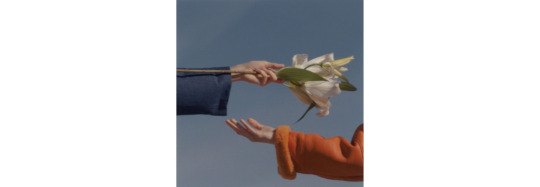
the deep tiles of the floor were cold— atleast sirius knew how cold the floor could be. from being laid upon it myriads of times at the hands of his very mother, the person who was suppose to kiss away your cuts, sew the patches of your clothes and wipe away your tears away, could only inflict pain on the vanquished boy. so, he knew how tremendously frigid his tiled floors were.
he knew stained paper, exceedingly smudged ink roaming the parchment from tears that fell upon his waterline and seeped deeply into the ivory-parchment with the black-family crest. deep snakes with a ‘B’ right in the middle, never-without the signature emerald-green ink.
some would say it was a crest of power, maybe envy. but to him— it was the crest of evil.
he knew pain, he knew guilt, he knew remorse— but there was one emotion that he was infact capable of, one that he barely knew due to the unstable bridges built in his household; the childhood emotion that was normally felt upon anyone, happiness. the boy could barely distinguish the feeling of happiness.
until the ripe age of eleven he knew dread, and breath-shaking fear, the next heir was all he was in the eyes of his family. till he was coated in the colours red and gold, directed from the sorting hat, and across the room he layed eyes upon you.
he couldn’t believe someone at the age of eleven was so beautiful, then he knew that you were kind from all the ‘hellos’ you had sent his way, that you were intelligent from every time in potions you would fix his notes without even asking, and then he knew that he didn’t just want you to be his friend.
he classified his three gryffindor mates as his family, his brothers. but you, you were different, he didn’t want sisterly love— he didn’t want platonic love that’s shared between close friends. the big realization that struck him at the blossoming age of thirteen, gaping at you writing your charms notes for him because of how intolerable his scrawny handwriting was.
the only sound to be heard the comfortable silence being the scratching of your quill against the parchment, a parchment that wasn’t stained with tears but still his to keep. over the holidays of third year he received a letter, from you, and for once when he received a letter— he didn’t have the urge to stain it with his despondent tears.
you were important, no, you were everything to him. so you could imagine his freight at the fact he could loose you, his person, with his heaps of feelings just ready to pour out to you without fault. so he waited, he waited for a long while.
he waited till evan rosier asked you on a date, he didn’t think he could have such feelings of spite and bitterness till it was displayed right in front of his demoralized eyes. then in one moment, he told you quite literally everything. but sirius was suddenly no longer frightful, he was beaming— because you his past best friend, was now his present girlfriend.
he was radiant, purely joyful with you on his arm. one to love, one to care, and one to be there through the thickness that he couldn’t endure alone. he was euphoric until one day he saw the same crest— and suddenly, the ink was smudged with the same sorrowful tears.
he sat in the same place upon his bed, the same designated bed he had for the past several years at hogwarts. thin ivory parchment clutched into his right hand, one singular sentence slithering through every nook and cranny in his mind like that same snake that was labeled upon the black-family crest.
‘we are setting you up for an arranged marriage.’
it was barely perceptible due to the crinkles in the paper and the amount of stygian ink smeared onto the thin paper that he had the urge to burn too ashes and just toss in his parents faces.
the room was dead silent, the window slightly creaked open to allow the gusts of cool air to formulate in the empty room; just the solemn boy sitting in his bed— receiving the worst news that could’ve ever been said to him. goosebumps were arising on his forearms like he was back to when he was the small boy when he was eleven, left frigid and terror-stricken on the black tiled floor.
he missed the sound of the creaking door and the murmured footsteps of your soft shoes against the hardwood floor of his dormitory. suddenly flinching at the touch of your hand on your shoulder, instantaneously gaping at your dismayed face.
he layed his hand upon yours, suddenly slotting his digits between your fingers. showing his remorse through his actions— his own exertion speaking louder than words ever could. you caught sight of the wrinkled sheet grasped in his opposite hand. you went to grab it seeing as to how much pain one piece of paper could cause a boy, your boy, sirius opting to push it away behind him.
“you are my family.” he first spoke in sincerity, not even a small amount of dishonesty in his tone. he grasped at your other hand, pulling you to sit right in front of his slouched form.
you saw the dilation in his pupil at his pearl-coloured irises. the gaze was strong, showing the bond you had both built over several years. the flecks of cerulean spotted in his irises, the outline of grey around his pupils. the shades of the ridden black-family now in the purest form.
“sirius... you’re not your family.” you had suspected that is what the streaked parchment had regarded, most likely another foul request of his family or unkind words directly from his mother.
“you are sirius black, my gryffindor keeper, the boy who turned into an animagus for his best friend. you’re not malicious, your compassionate and thoughtful.” you crooned directly to him, seeing him sit up a bit rather than a slouched and dejected form more-so hopeful and waiting in anticipation for your next words.
you were both silent for a moment, stroking his hand while he basked in your small affections. you were there— and boy did you care for him.
“i didn’t think it was possible to love someone this much.” he chucked, small sniffs lingering as he let the words carve into his mind that now he only started to believe. feeling your small strokes pause for a moment, he took it upon himself to press a small kiss to the palm of your hand, remaining the eye contact. the adoration in his eyes prominent as he looked at you.
he wasn’t evil, he was compassionate. and only now was he starting to believe it; because you of you.
taglist: @fific7 @wisedreamcatcher @kittykylax @ronbrokemyheart @aspiringsloth20 @georgeswh0re @amourtentiaa @msmb @fangouria @five-cups-of-coffee @dracofknmalfoy @emmaev @serenitywilderness @famdomhideout @hufflepogue @dear-luna @luvvninaz @miraclesoflove @black-like-my-soul
#sirius black x you#sirius black x daughter!reader#sirius black x gryffindor!reader#sirius black x ravenclaw!reader#sirius black x slytherin reader#sirius black x oc#sirius black#sirius black x reader#sirius black fluff#sirius black fanfiction#sirius black fic#sirius black angst#sirius black au#sirius x you#james & peter & remus & sirius#sirius x reader#sirius imagine#sirius x y/n#sirius orion black#harry potter fanfiction#harry potter smut#harry potter
316 notes
·
View notes
Text
Slytherin House in the role of the Outcast of Hogwarts: A meta on Slytherin House and its role in the seven Harry Potter books
There are two themes in the Harry Potter books and movies that I want to explore through this meta. The first is the role that Slytherin House plays as the outsiders within the narrative of the story. The second is the journey that the titular hero, Harry takes in how he views Slytherins, from a prejudiced, even at times bigoted view of them to acceptance and how he must overcome this prejudice in order to defeat Voldemort.
One of the most clearly defined themes that J.K. Rowling addresses in this series is that of prejudice. This includes not only the overt racism of Voldemort and his Death Eaters but also the ingrained, indifferent prejudices towards non-humans, such as house elves, centaurs and giants that many in the wizarding world regard as being inferior or evil just because they aren’t human.
But there is also the prejudice and discrimination directed towards Slytherin House by Harry and in many cases the rest of Hogwarts. Slytherins as a House, as a segment of the society within Hogwarts are viewed by most of the rest of Hogwarts as being evil and inferior simply because they are Slytherin.
Throughout most of this series Slytherin House is viewed as the house of the “Dark” witches and wizards as seen through the eyes of the protagonist, Harry. Over and over he (and thus we the readers) are told . . .
“There’s not a witch or wizard who went bad who wasn’t in Slytherin.” (PS,ill,p.65)
“[…] Slytherin, the house which had turned out more dark witches and wizards than any other.” (CS,ill,p.65)
This point of view is echoed in the behaviour of many others in the other Hogwarts houses. We are shown time and time again throughout the books that Slytherin House is left isolated and shunned by the rest of Hogwarts.
Let’s start at the beginning with “Harry Potter and the Philosopher’s Stone”.
Harry’s first encounter with overt prejudice and racism in the wizarding world comes from the person who will become his greatest rival within Hogwarts and for him in many ways the symbol of everything Slytherin House stands for; Draco Malfoy.
Even as a child, Draco Malfoy is a nasty, bigoted little brat.
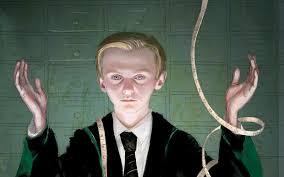
(PS, ill, p. 67)
“[…] but I know I’ll be in Slytherin, all our family have been – imagine being in Hufflepuff, I’d think I’d leave, wouldn’t you? … I really don’t think they should let the other sort in, do you? They’re just not the same, they’re never been brought up to know our ways. Some of them have never even heard of Hogwarts until they get their letter, imagine. I think they should keep it in the old wizarding families.” (PS,ill,p.68)
He’s also an elitist snob and a bully. Harry is right in thinking that Draco and Dudley have a lot in common.
But for all the racism and prejudice that Draco displays here the second example of prejudice and discrimination that Harry encounters in the wizarding world comes from Hagrid.
When Harry tells Hagrid about his encounter with Draco, Hagrid’s response is quite illuminating.
“’Better Hufflepuff than Slytherin.’ Said Hagrid. ‘There’s not a witch or wizard who went bad who wasn’t in Slytherin. You-Know-Who was one.’” (PS,ill,p.69)
In the movie this line is given to Ron Weasley but the sentiment is the same.
Now, first of all, Hagrid is incorrect. At the time he said this Sirius Black was rotting in Azkaban for supposedly betraying the Potters. Granted, he was innocent but it was a case of having the wrong Gryffindor, not that a Gryffindor didn’t go bad.
But we also need to keep in mind Hagrid’s own personal experience. He’d had his whole future destroyed by Tom Riddle when he was falsely accused of being the Heir of Slytherin. (Not that he knew that Riddle was the heir at the time or that he was framing him, but still). Also Hagrid was a member of Dumbledore’s Order of the Phoenix. He’d fought in the last Wizarding War where so many of the Death Eaters had come from Slytherin. He must have lost a lot of friends during that war and seen a lot of destruction. His prejudice is understandable. Many soldiers and victims of war often carry the same type of prejudice towards those they fought against. But it is still prejudice and as we are shown before the end of this book, Hagrid is wrong.
The other thing to keep in mind is that when Harry first comes to the wizarding world, he is pretty much a blank slate. He knows nothing about its history or society. And Hagrid has saved him. This is an eleven-year-old boy who has endured years of horrific mental, emotional and at times physical abuse at the hands of the Dursley’s. Hagrid burst into that hut and brought magic and wonder to a little boy who’d never really had anything and had been told his whole life that it was wrong to dream. He told Harry that he was special when the Dursley’s had always called him a worthless freak. It’s no wonder that Harry trusts him and believes him when he tells Harry that Slytherins are evil.
This prejudice is further enforced on the Hogwarts Express when Ron Weasley talks about the Houses.
“’What House are your brothers in?’ Harry asked.
“Gryffindor . . . Mom and Dad were in it too. I don’t know what they’ll say if I’m not. I don’t suppose Ravenclaw would be too bad, but imagine if they put me in Slytherin.’” (PS,ill,p.88)
Again, we have, through the opinion of the character who would become Harry’s first friend, the negative view of Slytherin being the worst of the Houses. This viewpoint is also further reinforced by the second appearance of Draco Malfoy who supposedly offers Harry his friendship but only because he’s the “Boy-who-lived” and wants to guide him away from the “wrong sort” right after insulting the person who been so friendly to Harry. Who didn’t grin when Harry told him, “I think I can tell who the wrong sort are for myself, thanks,”? (PS,ill,p.89) I certainly did.
But what these encounters do is lay the foundation for Harry’s view that all Slytherins are evil. Rowling specifically states this in the sorting ceremony where we get Harry’s impression of the Slytherins;
“’Perhaps it was Harry’s imagination, after all he’d heard about Slytherin, but he thought they looked an unpleasant lot.’” (PS,ill,p.98)
It is important to note that Rowling employees the point of view of the limited omniscient narrator for these books. We know what Harry is thinking and feeling because she tells us. But we only know the thoughts and feelings of all the other characters by their words and actions and how Harry interprets them.
This means that, through the course of these books the primary examples that we see of Slytherin House are Draco, Pansy, their cliques, Professor Snape and Voldemort. With the exception of Snape’s goal of protecting Harry by the end of the first book we are not offered any positive impressions of any Slytherin or of Slytherin House.
In the movie there is one exception to this and that is the scene in the Dark Forest when Harry and Draco see Quirrell/Voldemort drinking the blood of the unicorn. In both versions Draco runs away while Harry is paralyzed by the pain of his scar. (see the link for the full clip).
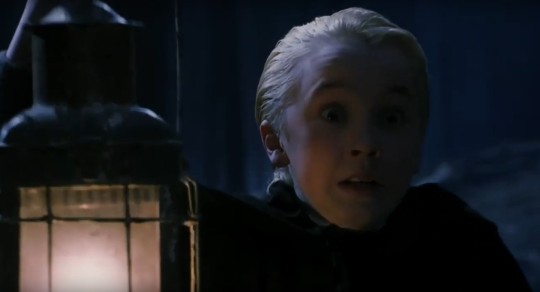
But while in the book this is the last that we see of Draco in that scene, in the movie he comes back.
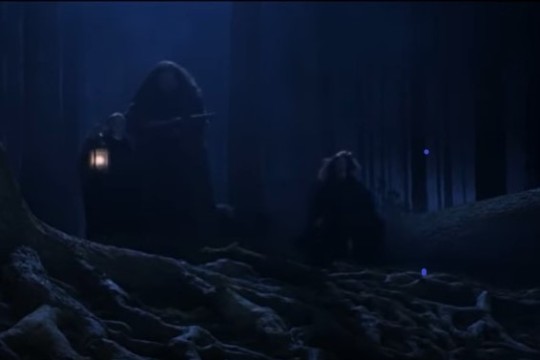
That figure on the far left holding the lantern? That’s Draco.
It’s important to note that not only did Draco come back, he brought back help. So, while he ran, he didn’t run away. He ran to find help and bring it back in order to save Harry. This was not only a very brave thing to do it was also a very Slytherin form of bravery. He ran and left Harry behind but he also returned, bringing back reinforcements.
This scene is one of the more striking divergences from the book in the portrayal of Draco Malfoy and Slytherin House.
But in both versions, we are shown Slytherin House’s isolation from and in some instances ostracization by the rest of Hogwarts. To demonstrate this, I want to bring forward two specific examples. The first is when Harry, Neville (Ron in the movie) and Hermione lose Gryffindor House one hundred and fifty points when they are caught out of bed after hours, sending Norbert the dragon away.
“From being one of the most popular and admired people at the school, Harry was suddenly the most hated. Even Ravenclaws and Hufflepuffs turned on him, because everyone had been longing to see Slytherin lose the House Cup.” (PS,ill,p.198)
Please note, it wasn’t just a matter of the other Houses wanting to see their own House win because if that were the case then Ravenclaw and Hufflepuff would have been happy because they would have advanced ahead. Nor is it just a matter of the rivalry between Gryffindor and Slytherin. Rather we are told that Ravenclaw and Hufflepuff specifically wanted Slytherin to lose just as much as Gryffindor did. Now, this could partly be because at this point Slytherin House had won the cup seven years in a row. But I do not think that this is only reason for when Gryffindor wins the House Cup at the end of the book, it marks the beginning of a winning streak for Gryffindor House, but we never shown Hufflepuff or Ravenclaw longing to see Gryffindor lose.
The second example is the awarding of the House Cup and Gryffindor’s dramatic victory.
Let me start by saying that Harry, Ron, Hermione and Neville totally deserved the house points they won. I cheered when I read that scene and when I saw it in the movie. (see the link for the full clip).

But let’s take a look at Dumbledore’s choice to first deck the Great Hall in Slytherin green, thereby giving the school (and us the readers) the impression that Slytherin had won.
In literature this is known as the “sudden reversal” or the Peripeteia, meaning “a sudden or unexpected reversal of circumstances or situation especially in a literary work”, according to the Merrriam-Websters dictionary.
It was certainly an excellent way of J.K. Rowling to write it. This is Harry’s story, and this is his moment of triumph and reward for defeating Voldemort.
Imagine if J.K. Rowling had written it this way: “Harry made his way to the end-of-year feast alone that night. He had been held back by Madam Pomfrey’s fussing about, insisting on giving him one last check up, so the Great Hall was already filled. He found the Great Hall already decked out in Gryffindor Red and Gold for while he had been in the hospital wing Dumbledore had awarded Ron and Hermione fifty points each for their actions in defeating Voldemort, Harry sixty points and Neville ten points for standing up to his friends, so Gryffindor had won the House Cup.”
Pretty awful isn’t it? If J.K. Rowling had written anything like that I would have been hugely let down to say the least. It would have been a horrible ending to the book.
But let’s turn the lens around and look at it from the point of view of the characters within the story, especially that of Slytherin House. As far as they knew they had won the House Cup before Dumbledore stood up and without warning awarded Gryffindor House 170 points.
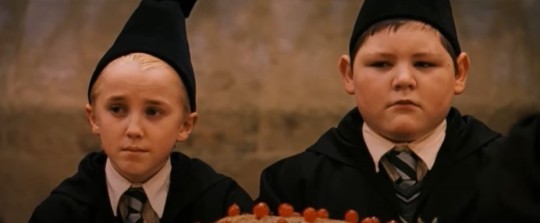
Now the House Cup is Hogwarts. The entire student body is disciplined or rewarded on a point system with the goal of their House winning it. To have the Headmaster suddenly award a huge amount of points to the House with the least amount of points at the last minute, when the Great Hall was already been decked out in the colours of the House who had seemed to have won . . . well this does not really give the impression of fairness to Dumbledore. Certainly, we are given the impression that Slytherin House had been insulted and humiliated in front of the entire school.
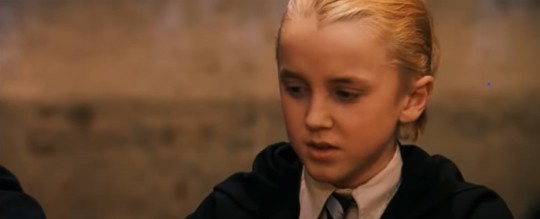
“[…] Malfoy, who couldn’t have looked more stunned and horrified if he’d just had the Body-Bind curse put on him.
“’Which means,’ Dumbledore called over the storm of applause, for even Ravenclaw and Hufflepuff were celebrating the downfall of Slytherin, ‘we need a little change of decoration.’
He clapped his hands. In an instant, the green hangings became scarlet and the silver became gold; the huge Slytherin serpent vanished and a towering Gryffindor lion took its place. Snape was shaking Professor McGonagall’s hand, with a horrible forced smile.” (PS,ill,p.245)
It is worth pointing out here that both Hufflepuff and Ravenclaw also cheered Gryffindor’s victory. Again this could partly be due to the fact that Slytherin had previously won the cup seven years in a row. But again this serves to demonstrate Slytherin House’s isolation within Hogwarts.
Now I’d like to turn that lens back around and focus on the readers and the Harry Potter fandom at large. One of the results of this scene was the creation of a large movement in the Harry Potter fandom who feels that Dumbledore is at the least being very unfair and biased against Slytherin House. All you have to do is Google “Slytherin losing the House Cup” and you will get multiple hits.
But more importantly in regards to the point of this meta, we the readers are clearly shown Slytherin House’s role as the outsider, outcast and isolated with the rest of the entire school cheering their loss.
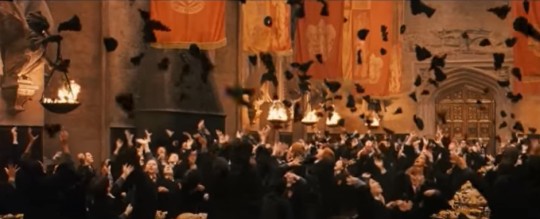
This theme of the isolation of Slytherin House is carried forward as we go into Harry’s second year. Again, we see Slytherin House primarily through Harry’s eyes, which means mostly, Draco, Lucius Malfoy, and Voldemort. A bigoted little bully, a would-be child-killer and a terrorist. There are few if any good representations of Slytherin House in this book but there a few things that I want to highlight here.
The first is where we learn about the legend of the Chamber of Secrets from Professor Binns.
“You all know, of course, that Hogwarts was founded over a thousand years ago – the precise date is uncertain – by the four greatest witches and wizards of the age. The four school Houses are named after them: Godric Gryffindor, Helga Hufflepuff, Rowena Ravenclaw and Salazar Slytherin. They built this castle together, far from prying Muggle eyes, for it was an age when magic was feared by common people, and witches and wizards suffered much persecution . . . For a few years, the founders worked in harmony together, seeking out youngsters who showed signs of magic and bringing them to the castle to be educated. But then disagreements sprung up between them. A rift began to grow between Slytherin and the others. Slytherin wished to be more selective about the students admitted to Hogwarts. He believed that magical learning should be kept within all-magic families. He disliked taking students of muggle parentage, believing them to be untrustworthy. After a while, there was a serious argument on the subject between Slytherin and Gryffindor and Slytherin left the school . . . The story goes that Slytherin had built a hidden chamber in the castle, which the other founders new nothing.
Slytherin according to legend, sealed the Chamber of Secrets as that none would be able to open it until his own true heir arrived at the school. The heir alone would be able to unseal the Chamber of Secrets, unleash the horror within, and use it to purge the school of all who were unworthy to study magic.” (CS, ill, p.115)
There are two parts of this speech that I want to focus on. The first is the reason why Salazar Slytherin wanted muggle-borns excluded from Hogwarts. It was not because he felt they were racially inferior as the Malfoys and Voldemort did but because he felt that they were untrustworthy. “Magic was feared by the common people and witches and wizards suffered much persecution.”
This part was cut out from the movie version but I feel it is an important part of Salazar’s character. Does the fact that muggles were persecuting witches and wizards make Salazar Slytherin right? No. Is he racist? Yes certainly. But as we’ll see before the end of this book, many Gryffindors including the Weasley’s were no better than Slytherin was.
Which brings me to Ron Weasley. It is right after Binns’ lecture in the History of Magic that Ron says:
“’I always knew Salazar Slytherin was a twisted old looney.’ Ron told Harry and Hermione . . . ‘But I never knew he started all this pure-blood stuff. I wouldn’t be in his house if you paid me. Honestly, if the Sorting Hat had tried to put me in Slytherin, I’d’ve got on the train straight back home.’” (CS, ill, p. 116)
Now, this statement combined with what Ron said about Slytherin House on the train in the Philosopher’s Stone, is exactly the same thing that Draco said about Hufflepuff House.
[Draco]: “ . . . imagine being in Hufflepuff, I’d think I’d leave,” (PS,ill,p.68)
[Ron]: “ . . . but imagine if they put me in Slytherin.’” (PS,ill,p.88)
[Ron]: “ Honestly, if the Sorting Hat had tried to put me in Slytherin, I’d’ve got on the train straight back home.’ (CS, ill, p. 116)
This not only shows us Ron’s prejudice against all Slytherins but also that the prejudice against them extends far beyond just the grounds of Hogwarts. This is only Ron’s second year and while Arthur Weasley and Lucius Malfoy do have a feud going on, this is beyond that. “I always knew Salazar Slytherin was a twisted old looney.” How could Ron have “always known” that? He certainly wasn’t born knowing it. No one is born knowing how to hate. You have to be taught it. And he certainly didn’t learn it from a book, not Ron Weasley. He’s not the good student or researcher. That’s Hermione. I think that Ron learned to think that all Slytherins are evil and twisted the same place that Draco Malfoy learned to think all Muggle-borns are evil and inferior. He learned it from his parents.
Again we have to consider the Weasley’s personal history here. Just like Hagrid, they fought in the last war. Molly lost her two brothers, Fabian and Gideon Prewett to Death Eaters (OoP,sch,p.158 and DH,sch,p.97). Both Molly and Arthur would have carried bitter memories of that struggle and their losses. As we can see, they passed that bitterness along to their children.
It is a demonstration of J.K. Rowling’s skill as a storyteller when she shows us that this is exactly the same type of persecution and prejudice that Harry endures for most of his second year when it’s discovered that he’s a parselmouth. Justin Finch-Fletchley runs away at the sight of him (CS, ill, p.112), Ernie McMillian says that he was born evil because he’s a parselmouth (CS, ill, p.152), and he’s shunned by most of the school. (CS, ill, p.160) This has a devastating effect on him as we are shown. He starts questioning himself and who he is.
In the book, “Harry lay awake for hours that night. Through a gap in the hangings around his four-poster he watched snow starting to drift pass the tower, and wondered.
Could he be a descendent of Salazar Slytherin? He didn’t know anything about his father’s family, after all . . . ‘But I’m in Gryffindor.’ Harry thought. ‘The Sorting Hat wouldn’t have put me in here if I had Slytherin blood . . .’
‘Ah.’ said a nasty little voice in his brain, ‘But the Sorting Hat wanted to put you in Slytherin, don’t you remember?” (CS, ill, p.149)
“He thought too, about what everyone was saying about him, and his growing dread that he was somehow connected to Salazar Slytherin.”
“He was tired of people skirting around him in the corridors, as though he were about to sprout fangs, or spit poison, tired of all the muttering, pointing and hissing as he passed.”(CS, ill, p.160)
In the movie we are shown;
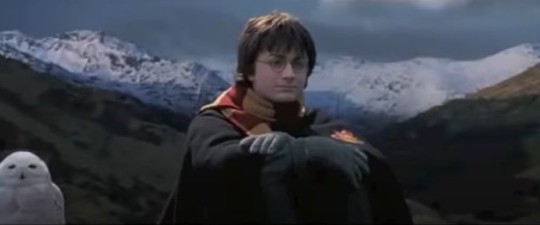
(see the link for the full clip)
[Harry] “Who am I, Hedwig? What am I?”
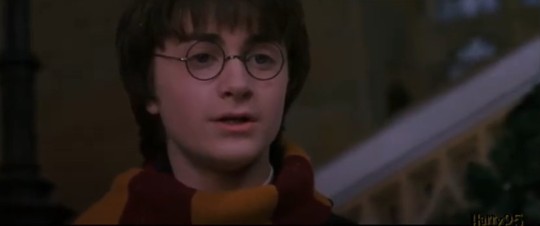
(see link for the full clip, it’s midway through)
[Ron]: “Oh, come on Harry. Fred and George are just having a laugh.”
[Harry]: “They’re the only ones.”
[Ron]: “Okay, so half the school thinks that you’re nipping off to the Chamber of Secrets every night? Who cares?”
[Harry]: “Maybe they’re right.”
[Hermione]: “Harry! Harry! Oh, come on!”
[Harry]: “Look, I didn’t know I could speak parseltongue. What else don’t I know about myself? Look . . . maybe you can do something . . . even something horrible and not know you did it.”
It is not the parseltongue ability that makes Harry question his identity or whether he is evil by nature. Harry has been a Parselmouth since the moment Voldemort tried to kill him and it has caused him no mental trauma at all. In fact he used this ability to set the python on Dudley in the Philosopher’s Stone and it did not bother him at all.
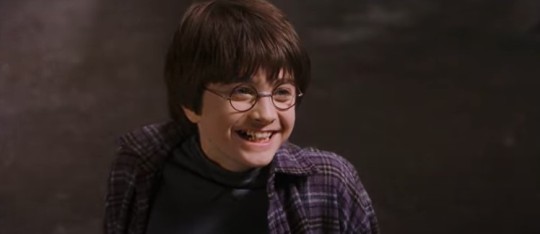
It is his treatment by the rest of the school, his peers and his community that causes this trauma. Harry is shunned and ostracized by a large part of the school, condemned as evil just because of an ability that was forced on him as an infant and that he has no control over.
If this is the type of ostracization and shunning that Harry Potter, The-Boy-Who-Lived is faced with when it’s revealed that he has the parseltongue ability then how can it not be the same, if not worse, for all of Slytherin House?
We are told that Salazar Slytherin was a parselmouth and according to Ernie McMillan, being a parselmouth is the mark of a Dark wizard.
“‘Hannah,’ said the stout boy solemnly, ‘he’s a Parselmouth. Everyone knows that’s the mark of a dark wizard. Have you ever heard of a decent one who could talk to snakes? They called Slytherin himself Serpent-tongue?” (CS, ill, p.152)
There we have not only Salazar Slytherin but snakes, the symbol of Slytherin House branded as dark and evil. Add in the isolation shown towards Slytherin House already discussed from the first book and we are left with a rather disturbing picture of how Slytherins are viewed and treated within Hogwarts.
If a few months of ostracization and shunning by two of the four houses can cause Harry such emotional trauma that he questions who and what he is and starts to believe that he might actually be evil, bearing in mind the years of this sort of treatment at the Dursley’s, then can you imagine what it would do to an eleven-year old when they first arrive at Hogwarts? They are told that their House will be like their family, then they are sorted and all of a sudden, they find out the hard way that they and their new “family” are viewed, if not outright dark and evil, certainly inclined towards it by the rest of their community. Over and over again the school is told about Voldemort and his Death Eaters, about how Salazar Slytherin was a supporter of pure bloods. Think of the whispers, the looks that followed Harry during his second year. Given the prejudice already shown against Slytherin House, I can imagine those same whispers, those same looks would follow every Slytherin all the time. And this would continue month after month, year after year. Can you imagine what this would do to a child in a community where your entire identity is wrapped up in your House? Add to that you’ve got those Slytherins like Malfoy and Parkinson and their gangs who talk about this “Great Dark Lord” and how he’s going to make everything right again.
I believe that there is a great deal of truth in the saying that children learn right and wrong from the adults around them and they learn by example. In the cases of the Slytherins, many do seem to carry the prejudice against muggles and muggle-borns (although as we’ll see this is not limited solely to Slytherin House) and their head of house, Professor Snape can’t really speak against this prejudice if he is to maintain his role as Dumbledore’s spy among the Death Eaters. As for the other adults around them, well, Flitwick and Sprout seem kindly and McGonagall is usually fair (except where Quidditch is concerned) but we never see them speak out against the prejudice or the isolation exhibited towards Slytherins.
This view of Slytherins House brings us back to the Chamber of Secrets and the reaction of many Gryffindors after Hermione and Penelope Clearwater were petrified by the basilisk.
“That’s two Gryffindors down, not counting a Gryffindor ghost, one Ravenclaw and one Hufflepuff.’ Said the Weasley twins friend Lee Jordan, counting on his fingers. ‘Haven’t any of the teachers noticed that the Slytherins are safe? Isn’t it obvious all this stuff’s coming from Slytherin? The heir of Slytherin, the monster of Slytherin – why don’t they just chuck all the Slytherins out?’ he roared to nods and scattered applause.” (CS, ill, p.195)
This scene is another testament to J.K. Rowling’s craft as a writer by not only demonstrating the prejudice and discrimination against Slytherin House; “Chuck all the Slytherins out.”, but also in her sharp and pointed use of situational irony. Because what Lee Jordan and his supporters want is the exact same thing that Salazar Slytherin wanted in regards to the muggle-borns and for the exact same reason, only now the roles are reversed. Just as Slytherin wanted all muggle-borns banned from the school because Muggles were persecuting wizards so too does Lee Jordan and the other Gryffindors who support him want all Slytherins banned because Slytherin House seems to be behind the attacks. In echoing this prejudice and desire to expel what they see as a collective enemy from their community they have in a way become Salazar Slytherin. Prejudice, racism and intolerance are the same no matter whom they are directed against. Here we see that all of Slytherin House is not only held responsible for the actions of one but is also even when it’s still unknown just who the heir of Slytherin is at this point.
Now as it turns out two Slytherins were responsible. Lucius Malfoy and Tom Riddle. Riddle may have been working through a Gryffindor but I agree with Dumbledore, “Older and wiser wizards than she have been hoodwinked by Lord Voldemort.” (CS, ill, p.251)
Yet Voldemort and Malfoy are only two Slytherins out of a population of probably thousands if we count the Slytherins who have graduated since Voldemort. They do not represent the whole, nor should the whole House be held responsible for the actions of one as Lee Jordan and the other Gryffindors insisted on earlier.
This point of not judging all the by the actions of a few is something that is illustrated later when Harry and Dumbledore are talking in his office and Harry says that the Sorting Hat was right.
“’So I should be in Slytherin,’ Harry said, looking desperately into Dumbledore’s face. ‘The Sorting Hat could see Slytherin’s power in me, and it –‘
‘Put you in Gryffindor,’ said Dumbledore calmly. ‘Listen to me, Harry. You happen to have many of the qualities Salazar Slytherin prized in his hand-picked students. His own rare gift of Parseltongue … resourcefulness … determination … a certain disregard for the rules.’” (CS, ill, p.253)
This is another slight departure in the books from the movie. In the movie Dumbledore states that Voldemort prizes these abilities rather than Salazar Slytherin. Salazar Slytherin and Tom Riddle are very different characters. Salazar was prejudiced and racist towards muggle-borns, yes. But he was not like Tom Riddle or Grindelwald, demanding genocide and slavery and power over the entire world. Indeed, when it came to the point of violence in the school Slytherin chose to seal the Chamber and leave rather than incite bloodshed. (OoP, p. 186) I’m not saying that Slytherin was a good man, he wasn’t. He was a racist. But as it’s been proven, he was no worse than Lee Jordan and many Gryffindors in this respect.
While within the community of Hogwarts we are shown that Slytherins are predominantly judged by the actions of the like of Voldemort and Malfoy, we the audience are shown evidence that this is not a valid or an accurate judgment. There are two scenes, one from the book and one from the movie which contradict the wholesale negative image of Slytherin House. In the book, when McGonagall announces that the Mandrakes are ready for cutting and that hopefully the culprit will be caught, “There was an explosion of cheering. Harry looked over at the Slytherin table and wasn’t at all surprised to see that Draco Malfoy hadn’t joined in.” (CS, ill, p.217) Please note the wording here. Rowling is very specific. Draco Malfoy had not joined in; she does not say that Slytherin House had not joined in. We see this same thing play out at the end of the movie version when Hagrid returns. (see the link for the full clip).
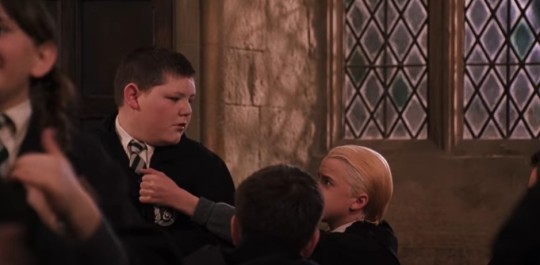
Yes, Draco stops Crabbe from rising to his feet to salute Hagrid. Please note that he had to stop him. But Draco’s group is a minority here. As we can see most of Slytherin House is on their feet as well, welcoming him home.
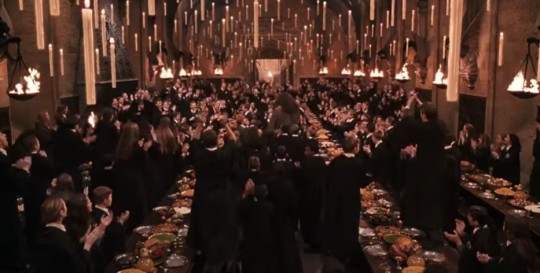
In both cases we are given proof that not all Slytherins are like Draco, Pansy and their cliques. Not all Slytherins are like Voldemort and his Death Eaters.
Now we come to the Prisoner of Azkaban. Once again, we are shown Slytherin House mainly through the actions of Draco Malfoy and Severus Snape. Malfoy behaves stupidly in the Care of Magical Creatures, gets hurt, and tries to get Buckbeak executed in order to hurt Hagrid. He, Crabbe, Goyle and Marcus Flint try to sabotage Harry during Quidditch (in a very stupid way) by dressing up as dementors.
Snape also comes across in the book as a bully time and time again and not just to Harry. During Potions class he bullies Neville. (PoA, ill, p.95) In his substitute lesson for Defense against the Dark Arts when Hermione speaks up to answer his question he slaps her down hard. “That is the second time you’ve spoken out of turn, Miss Granger,’ said Snape coolly. ‘Five more points from Gryffindor for being an insufferable know-it-all.’
Hermione went very red, put down her hand and stared at the floor with her eyes full of tears.”(PoA, ill, p.130)
But as bullying and as nasty as Draco and Snape are in this book, they are only two Slytherins out of a population of around 200. Yet as we are shown, the rest of Hogwarts judges and holds all Slytherins accountable for the actions of a few.
This is demonstrated quite clearly in the last match for the Quidditch Cup where we see once again the division within Hogwarts with the three Houses aligned against Slytherin.
“[The Gryffindor Quidditch team] walked out onto the pitch to a tidal wave of noise. Three-quarters of the crowd were wearing scarlet rosettes, waving scarlet flags with the Gryffindor lion upon them or brandishing banners with slogans such as ‘Go Gryffindor’ and ‘Lions for the Cup’. Behind the Slytherin goalposts, however, two hundred people were wearing green; the silver serpent of Slytherin glittered on their flags, and Professor Snape sat in the very front row, wearing green like every one else, and a very grim smile.” (PoA, ill, p.232)
Now there are two ways to look at this. On the one hand, this may very well be the consequences of Malfoy and Flint’s actions at the previous match. I can see how their blatant attempt at cheating and sabotage would probably have pulled a lot of support from the other Houses towards supporting Gryffindor when it came down to a choice between who to support, especially when their own Houses no longer had a stake in winning the cup. On top of this, it’s a sporting match at a boarding school. When it comes to supporting a team, impartiality and fairness can have tendency to go by the wayside. Just look at the supporters of football or hockey in the muggle world and you’ll know what I’m talking about.
But on the other hand, once again, we see Slytherin House as the outcast, the outsiders. There are no supporters for Slytherin in any of the other three Houses. This match can still be seen as another example of Slytherin Houses isolation and exclusion from the rest of their community.
Yet it is also in this book that Harry learns that the world is not made up of simply black and white, good and evil, with Gryffindor always being good and Slytherin always being evil. This is where Harry’s world view starts to be seriously challenged.
This is where Harry and thus we the readers, are shown that Gryffindors can be evil too. In fact, they can be backstabbing, traitorous, little cowards like Peter Pettigrew.
Pettigrew didn’t betray the Potters solely out of fear. As Sirius states, “‘You always liked big friends who’d look after you. It used to be us … you never did anything for anyone unless you could see what was in it for you … If he gave them Harry, who’d dare say he’d betrayed Lord Voldemort? He’d be welcomed back with honours.’” (PoA, ill, p. 278 -279)
Pettigrew, the Gryffindor, betrayed them out of ambition and a hunger for power, two of the traits that Slytherins are most condemned for.
Now let’s look at the actions and motivations of the one Slytherin in that scene.
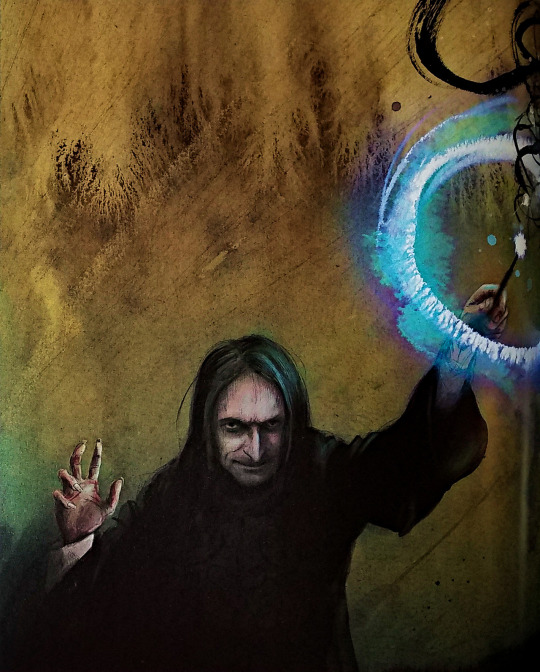
(PoA, ill, p. 271)
“‘Two more for Azkaban tonight,’ said Snape, his eyes now gleaming fanatically. ‘I shall be interested to see how Dumbledore takes this … he was quite convinced you were harmless; you know Lupin … a tame werewolf.’
‘You fool,’ said Lupin softly. ‘Is a school boy grudge worth putting an innocent man back into Azkaban?’
BANG! Thin, snake-like cords burst from the end of the Snape’s wand and twisted themselves around Lupin’s mouth, wrists and ankles; he over-balanced and fell to the floor, unable to move. With a roar of rage, Black started towards Snape, but Snape pointed his wand straight between Black’s eyes.
‘Give me a reason,’ he whispered. ‘Give me a reason to do it and I swear I will.’ . . .
‘Vengeance is very sweet,’ Snape breathed at Black. ‘How I hoped I would be the one to catch you …’ (PoA, ill, p. 271)
Lupin calls what Sirius did to Snape a trick (PoA, ill, p. 267) and on the surface, just going by what we have learned in the first three books it does seem to be just the school boy grudge that Lupin calls it.
But looking ahead, in book seven we learn that Harry’s mother Lily, was the great love of Snape’s life. She was the reason he had dedicated his life to protecting Harry.
This is important. It casts a different light on Snape’s reaction in Prisoner of Azkaban. He wasn’t just facing down his childhood tormentor, he was confronting the man he believed had betrayed the woman he loved to her death.
Yet we the readers don’t know this at this point. Harry doesn’t know it. We, like Harry, don’t find out until the very end the depth of Snape’s love and sacrifice. Only then, looking back can we see that at that moment in the Shrieking Shack, Severus Snape, the Slytherin was the bravest and most self-sacrificing person in the room.
But he was still blinded by his anger, pain and personal history with Sirius and Lupin. Harry, Ron and Hermione were right in doing what they did and knocking him out.
But Harry is just as blinded by his own hatred and prejudices against Slytherins and especially against Snape as Snape is against the Marauders as we’ll see going forward.
Now we come to the Goblet of Fire and once again our primary examples of Slytherin House are of Malfoy, Voldemort and the Death Eaters and once again we see them through Harry’s eyes. But as with each book Rowling makes things progressively more complicated and less black and white.
It is during the sorting that once again we are shown the hostility and prejudice towards Slytherin House by (at the very least) the Weasleys and Harry.
“‘Baddock, Malcolm!’
‘Slytherin!’
The table on the other side of the hall erupted with cheers; Harry could see Malfoy clapping as Baddock joined the Slytherins. Harry wondered whether Baddock knew that Slytherin House had turned out more dark witches and wizards than any other. Fred and George hissed as Baddock sat down.” (GoF, ill, p.119)
At this point I’m a little divided over whether this view of Slytherin House turning out more dark witches and wizards than of the others is actually Rowling stating this from the point of view as the omnipotent narrator or if it is simply Harry’s opinion because that’s what everyone has told him. It’s what “everyone” in Hogwarts knows. Much in the same way that Ernie McMillan back in the Chamber of Secrets states “‘[Harry’s] a Parselmouth. Everyone knows that’s the mark of Dark wizard.’” (CS, ill, p.152) Rowling never tells us just how many Slytherins went dark as opposed to the other Houses nor does she as the author show any character offering any proof of this. Once again, we are shown this only from Harry’s point of view.
The next element to this book is the reaction by Hufflepuff and Ravenclaw to Harry being chosen as the fourth champion.
The next few days were some of Harry’s worst at Hogwarts. The closest he had ever come to feeling like this had been during those months, in his second, year, when a large part of the school had suspected dim of attacking his fellow students. . . . it was lonely, with dislike pouring in on him from all sides.
He could understand the Hufflepuff’s attitudes, even if he didn’t like it; they had their own champion to support. He expected nothing less than vicious insults from the Slytherins – he was highly unpopular there and always had been, as he had helped Gryffindor beat them so often, both at Quidditch and in the Inter-House Championship. But he had hoped the Ravenclaws might have found it in their hearts to support him as much as Cedric. He was wrong, however. Most Ravenclaws seemed to think that he had been desperate to earn himself a bit m ore fame by tricking the Goblet into accepting his name. (Gof, ill, p. 188)
Now as I stated earlier, it is my opinion that this shunning and ostracization that Harry has endured twice now is that same that Slytherin House is subjected to all the time. Yet there is one difference. In Harry’s case it is directed only towards himself, not the rest of his entire House. We are never shown anyone saying that just because Harry is evil because he’s a parselmouth, then all Gryffindors are evil or because Harry cheated to become a Hogwarts Champion then all Gryffindors are cheaters. Now granted a large number of Slytherins did become Death Eaters, possibly (although this is not confirmed) even a majority of Death Eaters were. But as we have already been shown there were Death Eaters that came from Gryffindor and Ravenclaw, yet no one judges all of those Houses by the actions of those Death Eaters.
Now we come to the end of the Goblet of Fire and the closing ceremony.
What I want to draw attention to here are the actions of the Slytherins and how Harry perceives them.
“‘There is much that I would like to say to you all tonight,’ said Dumbledore, ‘but first I must acknowledge the loss of a very fine person, who should be sitting’ – he gestured towards the Hufflepuffs – ‘enjoying our Feast with us. I would like you all, please, to stand, and raise your glasses to Cedric Diggory.’
They did it, all of them; the benches scrapped as everyone in the hall stood, and raised their goblets, and echoed in one loud, low rumbling voice ‘Cedric Diggory.’” [emphasis mine] (GoF, ill, p 443-444)
And later when Dumbledore tells them that Cedric was killed by Voldemort …
“Stunned and frightened, every face in the Hall was turned towards Dumbledore now … or almost every face. Over at the Slytherin table, Harry saw Draco Malfoy muttering something to Crabbe and Goyle. Harry felt a hot, sickening swoop of anger in his stomach. He forced himself to look back at Dumbledore …
Dumbledore turned gravely to Harry and raised his goblet once more … Nearly everyone in the Great Hall followed suit. They murmured his name, as they had murmured Cedric’s and drank to him. But, through a gap in the standing figures, Harry saw Malfoy, Crabbe, Goyle and many of the other Slytherins had remained defiantly in their seats, their goblets untouched. Dumbledore, who after all possessed no magical eye, did not see them.” [emphasis mine] (GoF, ill, p 443-444)
It is important note (which is why I emphasized it) is that every single person in the Great Hall, including all the Slytherins, including Draco and Pansy and all of their cliques, all of them, rose to their feet and saluted Cedric Diggory. When Dumbledore saluted Harry, Rowling tells us that “Nearly everyone in the Great Hall followed suit” but “many” of the Slytherins including Draco did not. It is important to note what Rowling says here; “Nearly everyone” and “many” Slytherins. She does not say three quarters of the Hall rose and all the Slytherins did not. So I must conclude that there had been Slytherins (we aren’t told how many) who were on their feet toasting Harry’s bravery and his defiance of Voldemort. But as Rowling demonstrates to us, Harry didn’t see them. Harry saw only Malfoy and his gang.
This what I want to show here; how Harry’s view of Malfoy influenced how he viewed all Slytherins. When Harry saw Malfoy muttering to Crabbe and Goyle he felt a “hot, sickening swoop of anger in his stomach” and when the Great Hall rose to toast him Harry’s attention is focused on only those Slytherins who didn’t rise. Here Harry is as blind as he thinks Dumbledore is. Rowling writes that Dumbledore did not see the Slytherins who remained seated. But Harry equally could not see those Slytherins who stood because he was blinded by his own prejudice and hatred. As Rowling shows us over and over again Harry judges and holds all Slytherins accountable for the actions of Draco, Snape and Voldemort. This is indeed prejudice And it gets worse as we go into the fifth book.
This is where we meet Delores Umbridge. While J.K Rowling’s writing on Wizardingworld.com does not list the house she was in (see link) the original Pottermore did have her as a Slytherin if memory serves me correctly. We are also shown Malfoy and his clique join her inquisitorial squad and we are never shown or told if any members of the other Houses join. I think we can safely assume that there were no Gryffindors or Harry would certainly have seen them. However, I think that it would be wrong to assume that all of Slytherin House supported her. In the movie version we are, in fact, shown a number of Slytherins cheering Fred and George Weasley during their glorious fireworks escape. (See the link for the full clip)
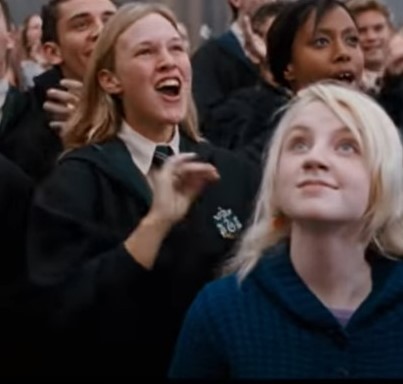
This dichotomy between how the other Houses view Slytherin and what we the audience are shown serves to illustrate the isolation and shunning of Slytherin House. Another example is when Hermione forms the DA and pushes Harry into leading it. Slytherin House is the only one not represented in the DA and the reason for this is that nobody invited them. Nobody reached out their hand. Yet Hermione’s stated goal was to help everyone learn how to defend themselves and pass their OWLs. I suspect many Slytherins wanted to do that too, especially the ones in the fifth and seventh years who were facing their OWLs and their NEWTs. Once again, the prejudice and discrimination against Slytherins by the other three houses, is clearly demonstrated here.
This is something that I believe Rowling does quite intentionally. She shows us this close to the beginning with the Sorting Hat’s song and Harry’s reaction to it.
“… Listen closely to my song;
�� Though condemned I am to split you
Still I worry that it’s wrong
Though I must fulfill my duty
Still I wonder whether Sorting
May not bring the end I fear.
Oh, know the perils, read the signs,
The warning history shows,
For our Hogwarts is in danger
From external, deadly foes
And we must unite inside her
Or we’ll crumble from within.” (OoP, Sch, P186-187)
This is a pretty clear condemnation of the House system and the disunity it brings by one of the most important and unbiased observers in all of Hogwarts. And then Rowling takes it a step further by showing us Harry’s reaction.
“‘And it wants all the Houses to be friends?’ said Harry, looking over at the Slytherin table, where Draco Malfoy was holding court. ‘Fat chance.’” (OoP, Sch, P189)
Again, Rowling shows us that Harry judges all Slytherins, even the newly sorted eleven-year-old first years by actions of Draco Malfoy. This is prejudice. In forming the DA Hermione, Harry and Ron manage to unite three of the four Houses but exclude Slytherin House.
Nor does Rowling stop there. As I mentioned earlier as these books progress and Harry grows up, things become more and more complicated and less and less black and white. The lines are becoming more blurred and those that Harry were taught were great and shining heroes turn out to have feet of clay.
I’m speaking of course of his trip into Snape’s memories where he gets the truth about his father and godfather’s interactions with Snape rammed right down his throat.
“‘I’m bored,’ said Sirius. ‘Wish it was the full moon.’
…’This’ll liven you up Padfoot,’ said James quietly. ‘Look who it is …’
Sirius’s head turned. He became very still, like a dog that had scented a rabbit.
‘Excellent,’ he said softly. ‘Snivellus.’
Harry turned to see what Sirius was looking at.
Snape was on his feet again, and was stowing the O.W.L. paper in his bag. As he left the shadows of the bushes and set off across the grass, Sirius and James stood up.
Lupin and Wormtail remained sitting: Lupin was still staring down at his book, though his eyes were not moving and a faint from line had appeared between his eyebrows; Wormtail was looking from Sirius and James to Snape with a look of avid anticipation on his face.
‘All right, Snivellus?’ said James loudly.
Snape reacted so fast it was as though he had been expecting an attack: dropping his bag, he plunged his hand inside his robes and his wand was halfway into the air when James shouted, ‘Expelliarmus!
Snape’s wand flew twelve feet into the air and fell with a little thud in the grass behind him. Sirius let out a bark of laughter.
‘Impedimenta!’ he said, pointing his wand at Snape, who was knocked off his feet halfway through a dive towards his own fallen wand.
Students all around had turned to watch. Some of them had got to their feet and were edging nearer. Some looked apprehensive, others entertained.
Snape lay panting on the ground. James and Sirius advanced on him, wands raised. James glancing over his shoulder at the girls at the water’s edge as he went. Wormtail was on his feet now, watching hungrily, edging around Lupin to get a clearer view.
‘How’d the exam go, Snivelly?’ said James.
‘I was watching him, his nose was touching the parchment,’ said Sirius viciously. ‘There’ll be great grease marks all over it, they won’t be able to read a word.’
Several people watching laughed; Snape was clearly unpopular. Wormtail sniggered shrilly. Snape was trying to get up, but the jinx was still operating on him; he was struggling, as though bound by invisible ropes.
‘You – wait,’ he panted, staring up at James with an expression of purest loathing, ‘you – wait!’
‘Wait for what?’ said Sirius coolly. ‘What’re you going to do, Snivelly, wipe your nose on us?’
Snape let out a stream of mixed swear words and hexes, but with his wand ten feet away nothing happened.
‘Wash out your mouth,’ said James coldly. ‘Scourgify!’
Pink soap bubbles streamed from Snape’s mouth at once; the froth was covering his lips, making him gag, choking him -
‘Leave him ALONE!’
James and Sirius looked round. James’s free hand immediately jumped up to his hair.
It was one of the girls form the lake edge. She had thick, dark red hair that fell to her shoulders, and startlingly green almond-shaped eyes – Harry’s eyes.
Harry’s mother.
‘All right, Evans?’ said James, and the tone of his voice was suddenly pleasant, deeper, more mature.
‘Leave him alone,’ Lily repeated. She was looking at James with every sign of great dislike. ‘What’s he done to you?’
‘Well,’ said James, appearing to deliberate the point, ‘it’s more the fact that he exists, if you know what I mean …’
Many of the surrounding students laughed, Sirius and Wormtail included, but Lupin, still apparently intent on his book, didn’t, and nor did Lily.
‘You think you’re funny,’ she said coldly. ‘But you’re just an arrogant, bullying, toerag, Potter. Leave him alone.’
‘I will if you go out with me, Evans,’ James said quickly. ‘Go on … go out with me and I’ll never lay a wand on old Snivelly again.’
Behind him, the Impediment Jinx was wearing off. Snape was beginning to inch towards his fallen wand, spitting out soapsuds as he crawled.
‘I wouldn’t go out with you if it was a choice between you and the giant squid,’ said Lily.
‘Bad luck Prongs,’ said Sirius briskly, and turned back to Snape. “OI!’
But too late; Snape had directed his wand straight at James; there was flash of light and a gash appeared on the side of James’s face, spattering his robes with blood. James whirled about; a second flash of light later, Snape was hanging upside-down in the air, his robes falling over his head to reveal skinny, pallid legs and a pair of greying underpants.
Many people in the small crowd cheered; Sirius, James and Wormtail roared with laughter.
Lily, whose furious expression had twitched for an instant as though she was going to smile, said, ‘Let him down!’
‘Certainly,’ said James and he jerked his wand upwards; Snape fell into a crumpled head on the ground. Disentangling himself from his robes he got quickly to his feet, wand up, but Sirius said, ‘Petrificus Totalus!’ and Snape keeled over again, rigid as a board.
“LEAVE HIM ALONE!’ Lily shouted. She had her own wand out now. James and Sirius eyed it warily.
‘Ah, Evans, don’t make me hex you,’ said James earnestly.
‘Take the curse off him, then!’
James sighed deeply, then turned to Snape and muttered the counter-curse.
‘There you go,’ he said as Snape struggled to his feet. ‘You’re lucky Evans was here, Snivellus –‘
‘I don’t need help from filthy little Mudbloods like her!’
Lily blinked.
‘Fine,’ she said coolly. ‘I won’t bother in the future. And I’d wash your pants if I were you, Snivellus’
…
‘Right,’ said James, who looked furious now, ‘right – ‘
There was another flash of light, and Snape was once again hanging upside-down in the air.
‘Who wants to see me take off Snivelly’s pants?’ (OoP, sch, p. 568-572)
There are a few things that I want to look at here. First of all, as Lily flat out states, James, Sirius and Wormtail are bullies. It is James and Sirius who initiate the attack and do so for no other reason then they’re bored. When Lily demands to know what Snape had ever done to James, he tells her that it’s more the fact that Snape exists.
Second, this is the exact same thing that the Death Eaters at the Quidditch World Cup did to the muggle family who ran the camp ground and they did it for the exact same reason.
‘A crowd of wizards, tightly packed and moving together with wands pointed straight upwards, were marching slowly across the field … High above them, floating in mid-air, four struggling figures were being contorted into grotesque shapes. It was as though the masked wizards on the ground were puppeteers, and the people above them were marionettes operated by invisible strings that rose from the wands into the air. Two of the figures were very small … the floating people were suddenly illuminated as they passed over a burning tent and Harry recognised one of them – Mr. Roberts, the campsite manager. The other three looked as though they might be his wife and children. One of the marchers below flipped Mrs. Roberts upside-down with his wand; her nightdress fell down to reveal voluminous drawers; she struggled to cover herself up as the crowed below her screeched and hooted with glee. (GoF, ill, p.84)
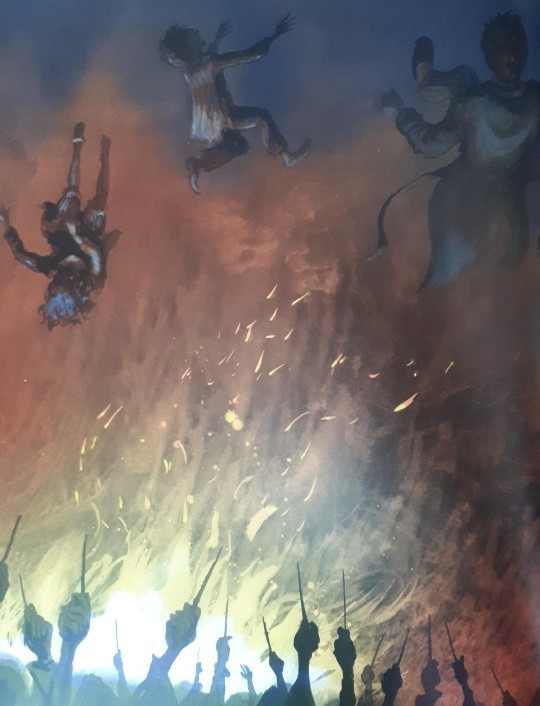
And just in case we missed it, Rowling hammers this lesson home in the sixth book.
“‘My Dad used this spell,’ said Harry. ‘I – Lupin told me.’
This last part was not true, in fact, Harry had seen his father use this spell on Snape, but he had never told Ron and Hermione about that particular excursion into the pensive . . .
‘Maybe your Dad did use it Harry,’ said Hermione, ‘but he’s not the only one. We’ve seen a whole bunch of people use it, in case you’ve forgotten. Dangling people in the air; making them float along, asleep, helpless.’
Harry stared at her. With a sinking feeling, he, too, remembered the behaviour of the Death Eaters at the Quidditch World Cup.’” (HBP, sch, p.226-227)
Please note that the reaction of the Death Eaters to the humiliation of the muggles is the same as the crowd around the lake to Snape’s humiliation.
“Many people in the small crowd cheered; Sirius, James and Wormtail roared with laughter.
Lily whose furious expression had twitched for an instant as though she were going to smile, said, ‘Let him down.’” (OoP, sch, p.571)
The parallels that Rowling draws here are very explicit and clear. James Potter and his gang of Marauders were just as much bullies and thugs as those Death Eater and while some might argue that the Marauders didn’t actually do any physical harm, unlike the Death Eaters and Snape, I would disagree. James Potter and his friends were the type of bullies that focused more on humiliation then physical harm. For them it was about humiliating and degrading their victims, of stripping them of every ounce of pride and dignity in order to demonstrate their own power and domination. For every bully that is what it is all about.
And humiliation hurts. Humiliation can leave scars as deep as any beating and can sometimes be just as crippling.
Rowling shows us this very well in Harry’s reaction to what he saw in the pensive.
“What was making Harry feel so horrified and unhappy was not being shouted at or having jars thrown at him; it was that he knew how it felt to be humiliated in a circle of onlookers, knew exactly how Snape had felt as his father had taunted him . . .” (OoP, sch, p.573)
But just as Harry knew this pain, I think that from the isolation and shunning of Slytherin House that Rowling has repeatedly shown us throughout these books, Slytherins know this pain too. Every sideways glance, every whisper in the halls, every time they are cut out or excluded or simply branded as evil just for being Slytherin, they have known this pain.
To me it is a twist of brilliant irony that the person most ultimately responsible for saving Harry at the Battle of the Department of Mysteries was not only a Slytherin but the Slytherin that he hated the most; Severus Snape. Snape lied to Umbridge and carried Harry’s warning to Sirius and the Order. (OoP, sch, p.732,734)
Without that lie Umbridge would have found out about Sirius and the Order of the Phoenix and that would have been disastrous. If Snape hadn’t warned Sirius and the Order they wouldn’t have come to the rescue of Harry and his friends and Voldemort would not only have gotten the prophecy but Harry and all his friends would probably have been killed. It was Snape, the head of Slytherin House who ultimately saved Harry again.
Not that Harry could see this at the time.
“‘What about Snape?’ Harry spat. ‘You’re not talking about him, are you? When I told him Voldemort had Sirius he just sneered at me as usual –‘
‘Harry, you know Professor Snape had no choice but to pretend not to take you seriously in front of Dolores Umbridge,’ said Dumbledore steadily, ‘but as I have explained, he informed the Order as soon as possible about what you had said. It was he who deduced where you had gone when you did not return from the Forest. It was he, too, who gave Professor Umbridge fake Veritaserum when she was attempting to force you to tell her Sirius’s whereabouts.’
Harry disregarded this; he felt a savage pleasure in blaming Snape, it seemed to be easing his own sense of dreadful guilt, and he wanted to hear Dumbledore agree with him.’ (OoP, sch, p.734)
In all fairness I can forgive Harry’s blindness and his willingness to blame Snape for Sirius’s death, especially given his anger and pain at losing someone he loved. When it came to Harry, Snape was probably the worst bully in the school barring only the temporary exception of Umbridge. Harry didn’t know at this point how much Snape had loved his mother or his vow to protect her son. He only knew how Snape had treated him and Dumbledore’s repeated insistence that since he had complete trust in Snape then Harry should blindly trust Snape as well wasn’t enough.
But Harry’s anger towards Snape is partly what feeds his prejudice towards Slytherins as a whole. Harry is prejudiced and has been since before he ever encountered Snape or Voldemort as we saw during his Sorting in The Philosopher’s Stone. This is something that is demonstrated very clearly in the sixth book.
The first occasion is where he meets Horace Slughorn and learns that he was Head of Slytherin House.
“‘I was Head of Slytherin;’ said Slughorn. ‘Oh, now,’ he went on quickly, seeing the expression on Harry’s face and wagging a stubby finger at him, ‘don’t go holding that against me!’” (HBP, sch, p.71)
As Slughorn points out Harry is prejudiced against Slytherins and does hold this against Slughorn. That’s clear.
Not that Slughorn doesn’t have his own biases.
“‘Your mother was Muggle-born, of course. Couldn’t believe it when I found out. Thought she must have been pure-blood, she was so good.’
‘One of my best friends is Muggle-born,’ said Harry, ‘and she’s the best in our year.’
‘Funny, how that happens sometimes, isn’t it?’ said Slughorn.
‘Not really,’ said Harry coldly.
Slughorn looked down at him in surprise.
‘You mustn’t think I’m prejudice!’ he said. ‘No, no, no! Haven’t I just said that your mother was one of my all-time favourite students? And there was Dirk Cresswell in the year after her, too – now Head of the Goblin Liaison Office, of course – another Muggle-born, a very gifted student.’” (HBP, sch, p.71-72)
Now while it’s clear that Slughorn does think that Muggle-borns are disadvantaged when it comes to magic, he never denied that they could be extremely gifted and favoured and supported them even over less talented pure-bloods when they did, regardless of House.
I would say that at his worst Slughorn is no more prejudice towards Muggle-borns then McGonagall and the Weasley’s are towards Muggles. And they are.
In the beginning of The Philosopher’s Stone, McGonagall tells Dumbledore “‘- even the Muggles have noticed something’s going on. It was on their news . . . Well they’re not completely stupid.’” (PS, ill, p.8)
In The Chamber of Secrets, Fred Weasley tell Harry “‘A lot of wizards think it’s a waste of time, knowing this sort of muggle trick [picking locks], but we feel they’re (sic) skills worth learning, even if they are a bit slow.’” (CS, ill, p.20) and in The Half-Blood Prince Fred points out the Muggle magic tricks in their shop and says “‘For freaks like Dad, you know, who love Muggle stuff.’” (HBP, sch, p.115)
These are only a few examples. I could name more if I had space.
This opinion (which I think is very common in the wizarding world) is that because Muggles can’t do magic, Muggles are therefore slow and stupid. In my opinion, this is definitely racism and prejudice. And please note, these opinions are expressed by many including those characters portrayed as the “good guys” in the narrative.
Which brings us back to Slughorn and Harry. I would say that Slughorn is far less prejudiced and far more supportive towards Muggle-borns than Harry is towards Slytherins. Slughorn merely thinks that Muggle-borns have a disadvantage compared to pure-bloods, When they show talent, he recognises this and supports them. He gives them a chance. Harry on the other hand, as we have seen, is very prejudiced towards Slytherins, judging all as evil or at the very least cowardly and never once does he ever give any Slytherin even one chance.
Which brings us to the first meeting of the Slug Club on the train. This is where we meet Blaize Zabini.
“[Harry] recognised a Slytherin from their year, a tall black boy with high cheekbones and long, slanting eyes . . . Zabini did not make any sign of recognition or greeting, and nor did Harry or Neville; Gryffindor and Slytherin students loathed each other on principal . . . Zabini, who was interrogated after McLaggen, turned out to have a famously beautiful witch for a mother (from what Harry could make out, she had been married seven times, each of her husbands dying mysteriously and leaving her mounds of gold.)” (HBP, sch, p.137, 138-139)
There are two things that I want to bring to your attention. The first is where it talks about Gryffindor and Slytherin students loathing each other on principal. This is not just simple House rivalry here; there’s real hatred and Rowling does not say it’s because “Slytherins are evil and Gryffindors are good.”
Which brings me to my second point and that is Zabini’s looks. Barring only the former exceptions of Tom Riddle and Bellatrix Lestrange this is the first time that any member of Slytherin House has been described in the books as physically attractive.
If you look at how most Slytherins are described in the books when seen through Harry’s eyes they are almost always seen as being uniformly physically ugly. Crabbe and Goyle are variously described as being troll-like or Gorilla-like, (CS, ill, p.165) Pansy Parkinson is described as having a pug face, (PoA, ill, p.72) Millicent Bulstrode is seen by Harry as “. . . a picture he’s seen in Holidays with Hags. She was large, square and her heavy jaw jutted aggressively.” (CS, ill, p.145). Marcus Flint is also described as having troll blood in him. (PS, ill, p.153)
As for Draco Malfoy, while in the movie version, Tom Felton is very handsome young man, in the book he is described as pale, washed out and with features like a ferret. (GoF, ill, p.69)
As for the adult Slytherins we encounter, Dolores Umbridge looks like a toad (OoP, sch, 134) and Snape is described as sallow skinned, with greasy hair and a hooked nose. (PS, ill, p. 104) Even Slughorn is described as massively obese with a moustache that looks like a walrus. (HBP, sch, p.137)
This brings me back to Slughorn. In forming the Slug Club Horace Slughorn becomes unique amongst Hogwarts Professors and in his way quite a remarkable and brave character. Because while Slytherins are usually cast in the role of the outsider and the outcast, Slughorn, a Slytherin, is the only one to breach this barrier and truly create a form of interhouse unity of all four Houses with his Slug Club. Inclusion in this club was based on merit not wealth or blood or House and he used this club to forge connections and alliances between members of all the Houses. Yes, he gets something out of it too. He likes knowing famous and powerful people and knowing that he’s helped them on their path. He likes the gifts and the attention they show him. But it’s not about power. He never asks for political favours or handouts or anything like that. The people that he helps, regardless of their House get far more out of the Slug Club then he does.
I find it very interesting that Rowling shows us that the only person to unite all four Houses and do so solely on a merit-based system was not only a Slytherin but the former Head of Slytherin House. This is something that not even Dumbledore managed to do. It is the only example that we see of complete interhouse unity in all seven books, at least that we are shown through Harry’s eyes. As I’ve mentioned, this is Harry’s story and Harry as we have seen is undoubtedly prejudiced against Slytherins, especially Draco Malfoy.
This prejudice is well known to those around him and comes back to bite him in this book. Because he is right when he claims that Draco has become a Death Eater and that he was up to something bad in Hogwarts. But nobody believes him, partly because to date Malfoy has come off as pretty pathetic, failing every time he’s tried to best Harry but also largely because Harry has made no secret of his hatred of Draco and Snape and his prejudice against Slytherins. This is clearly shown in the book when he tells his theory to Ron and Hermione.
“‘He’s a Death Eater,’ said Harry slowly. ‘He’s replaced his father as a Death Eater!’
There was silence, then Ron erupted in laughter.
‘Malfoy? He’s sixteen, Harry! You think You-Know-Who would let Malfoy join?’
‘It seems very unlikely, Harry,’ said Hermione, in a repressive sort of voice. ‘What makes you think - ?’
‘In Madam Malkin’s. She didn’t touch him, but he yelled and jerked his arm away from her when she went to roll up his sleeve. It was his left arm. He’s been branded with the Dark Mark.’
Ron and Hermione looked at each other.
‘Well . . .’ said Ron, sounding thoroughly unconvinced . . .” (HPB, sch, p.144)
In the movie this is made even more clear in the scene between Remus and Harry in the Burrow. (see link for the full clip)
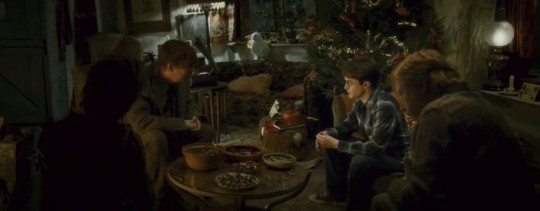
[Harry] “Dumbledore can make mistakes, he said so himself.”
[Remus] “You’re blinded by hatred.”
[Harry] “I’m not.”
[Remus] “Yes you are!”
But it’s in this book that Harry and thus we the readers are shown our first humanization of Malfoy. Until now we knew so little of his character beyond what he showed to Harry that he was almost a caricature. He was a bully, a coward, someone who hid behind his father’s name and money and until now that’s pretty much was all that he was.
But Rowling continually brings out new depths to her characters and makes us see them in a different light by making Harry see them in a different light too.
I am of course referring to the bathroom scene. In the movie we see; (see link for the full clip)
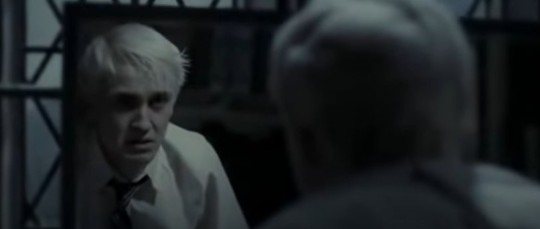
In the book we are told;
“Draco Malfoy was standing with his back to the door, his hands clutching either side of the sink, his white-blond head bowed.
‘Don’t,’ crooned Moaning Myrtle’s voice from on of the cubicles. ‘Don’t . . . tell me what’s wrong . . . I can help you.’
‘No one can help me,’ said Malfoy. His whole body was shaking. ‘I can’t do it . . . I can’t . . . it won’t work . . . and unless I do it soon . . . he says he’ll kill me . . .’
And Harry realised with a shock so huge it seemed to root him to the spot, that Malfoy was crying – actually crying – tears streaming down his face into the grimy basin. Malfoy gasped and gulped and then, with a great shudder looked up in to the cracked mirror and say Harry starring at him over his shoulder.” (HBP, sch, p.448)
This scene differs between the book and the movie. In the movie it is Draco seeing Katie Bell and facing what he’s done that triggers the scene and Harry is much more the accuser and initial (verbal) aggressor. In the book we are shown that it is Draco realising that war is not fame and glory but death and pain and the loss of loved ones. Because of course, as we learn by the end of the book it’s not just Draco who is in danger from Voldemort, it’s his family.
“‘I haven’t got any options!’ said Malfoy, and he was suddenly as white as Dumbledore. ‘I’ve got to do it! He’ll kill me! He’ll kill my whole family!’” (HBP, sch, p.552)
It is not just his own life that Draco’s afraid for, it’s everyone he loves.
In both versions Draco does try to use the Cruciatus curse on Harry during the fight. It is the exact same curse that Harry has already tried to use once on Bellatrix Lestrange for revenge.
It is this scene that his fear and (in the movie) guilt over what he’s done that shows us the human side to Draco Malfoy, who has been one of the most predominant images of Slytherin House for Harry and thus the readers.
This is further reflected in Dumbledore’s death scene. (see link for the full clip)
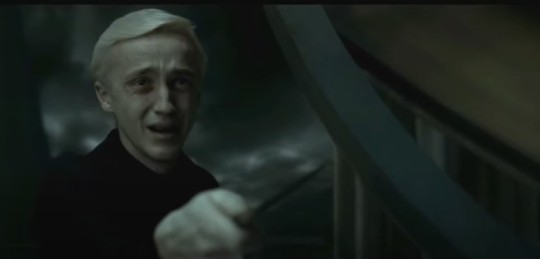
In the book version Draco is trying to show more bravado to work himself up to killing Dumbledore, but in both versions his guilt and horror over what he’s already done clearly shows.
“‘I’ve got a job to do.’
‘Well then, you mut get on and do it, my dear boy.’ said Dumbledore softly.
There was silence . . . Draco Malfoy did nothing but stare at Albus Dumbledore who incredibly smiled.
‘Draco, Draco, you’re not a killer.’
‘How do you know?’ said Malfoy at once . . . ‘You don’t know what I’m capable of.’ Said Malfoy more forcefully. ‘You don’t know what I’ve done!’
‘ . . . Perhaps you ought to get on with the job alone.’ Suggested Dumbledore . . . ‘And after all, you don’t really need help . . . I have no wand at the moment . . . I cannot defend myself.’
Malfoy merely stared at him . . . Malfoy looked as though he was fighting down the urge to shout, or to vomit . . .
‘My dear boy, let us have no more pretence about that. If you were going to kill me, you would have done it when you first Disarmed me, you would not have stopped for this pleasant chat about ways and means.’” (HBP, sch, .546-552)
I want to point out that in all seven of the Harry Potter books this is the first time that we see Dumbledore reach out to a Slytherin without wanting something in return. Slughorn, he wanted back in Hogwarts to access his hidden memory. Snape, he demanded that he turn spy against Voldemort in exchange for protecting Lily Potter. In short, he wanted to use them. One can argue that this was the necessity of war, and this would be a valid argument. However, until Draco, he does not reach out to any Slytherin for any other reason.
If we look back to the Goblet of Fire Dumbledore urges Fudge to reach out to the giants and Fudge rejects this.
“‘The second step you must take – and at once,’ Dumbledore pressed on, ‘is to send envoys to the giants.’
‘Envoys to the giants?’ Fudge shrieked, finding his tongue again. ‘What madness is this?’
‘Extend them the hand of friendship, now, before it is too late,’ said Dumbledore, ‘or Voldemort will persuade them, as he did before, that he alone among wizards will give them their rights and freedom!’
‘You – you cannot be serious!’ Fudge gasped, shaking his head, and retreating further from Dumbledore. If the magical community got wind that I had approached the giants – people hate them Dumbledore – end of my career.’”(GoF, ill, p.436)
We later learn that Dumbledore sends Hagrid and Lupin to the giants and werewolves with offerings of peace and support behind the Ministry’s back. He knows that these outcasts will make up a large part of Voldemort’s army.
But in all the Harry Potter books and movies this one time with Draco is the only time that he ever makes this gesture towards those we have been shown are the most outcast and outsiders in his own school, the Slytherins.
I must point out though that we do see him do this with Leta LeStrange in the Crimes of Grindelwald movie. (see link for the full clip).
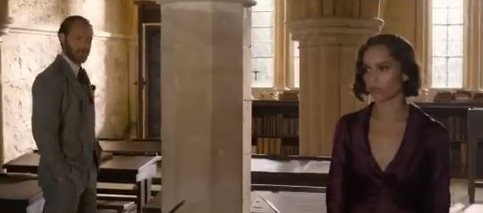
[Dumbledore] “Hello Leta. This is a surprise.”
[Leta] “Finding me in a classroom? Was I such a bad student?”
[Dumbledore] “On the contrary you were one of my cleverest.”
[Leta] “I said bad not stupid. Don’t bother answering. I know you never liked me.”
[Dumbledore] “I never thought you bad.”
[Leta] “You were alone then.”
[Dumbledore] “Leta, I know how painful the rumors about your brother, Corvus, must be for you.”
[Leta] “No. You don’t. Not unless you had a brother who died too.”
[Dumbledore] “In my case it was my sister.”
[Leta] “Did you love her?”
[Dumbledore] “Not as well as I should have done. Never too late to free yourself. Regret is my constant companion. Do not let it become yours.”
Dumbledore reaches out here to a Slytherin in a way we never see him do in the Harry Potter books or movies, not even at the end with Draco, not to this extent.
It is also in the scene between Draco and Dumbledore that Harry gets his second contradiction about everything he had assumed Malfoy and all Slytherins to be. Because Malfoy lowers his wand
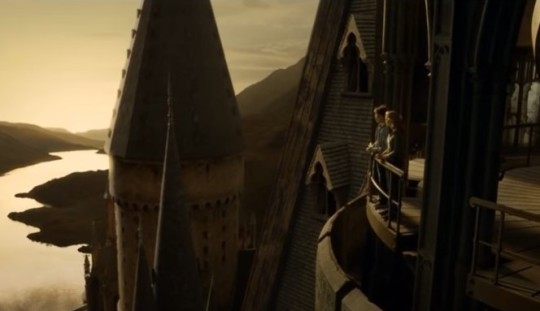
[Hermione] Do you think he would have done it? Draco?
[Harry] No. No, he was lowering his wand.
Now we come to the Deathly Hallows and this is where everything comes to a head on so many levels. One of them is the prejudice and discrimination towards Slytherin House by the rest of Hogwarts. This is where Harry finally has the last of his prejudices ripped from his eyes.
It begins with Harry being forced to watch Voldemort order Draco to torture his fellow Death Eaters under threat of being tortured himself if he doesn’t.
“Malfoy’s gaunt, petrified face seemed branded on the inside of his eyes. Harry felt sickened by what he had seen, by the use to which Draco was now being put by Voldemort.” (DH, sch, p.145)
For Harry, who judged all Slytherins largely on the actions of Draco (but also Voldemort and Snape) to see Draco being forced to do this and being sick and terrified by it is one of his turning points.
His second lesson comes with Regulus Black, Sirius’ brother, who was a Slytherin. When we’re first introduced to him by Sirius in The Order of the Phoenix Sirius describes him as “‘. . . my idiot brother, soft enough to believe them . . . Stupid idiot . . . he joined the Death Eaters . . . he was murdered by Voldemort . . . From what I found out after he died, he got in so far, then panicked about what he was being asked to do and tried to back out.’” (OoP, sch, p.104)
Soft, stupid and weak is how Sirius, Harry and thus we the readers are first introduced to Regulus through Sirius’ point of view. But in the Deathly Hallows Rowling tears this misconception to shreds and shows us a Slytherin who is noble, self-sacrificing, kind and compassionate.
“‘And one day, a year after he had joined [the Death Eaters], Master Regulus came down to the kitchen to see Kreacher. And Master Regulus said . . . he said . . .
The old elf rocked faster than ever.
‘. . . he said the Dark Lord required an elf.’ . . .
‘Oh, yes,’ moaned Kreacher. ‘And Master Regulus had volunteered Kreacher. It was an honour, said Master Regulus, an honour for him and for Kreacher, who must be sure to do whatever the Dark Lord ordered him to do . . . and then to come home.’ . . .
‘So Kreacher went to the Dark Lord. The Dark Lord did not tell Kreacher what they were to do, but took Kreacher with him to a cave beside the sea. And beyond the cave there was a cavern, and in the cavern was a great black lake . . .’
‘There was a b-basin full of potion on the island. The D-Dark Lord made Kreacher drink it . . . Kreacher drank, and as he drank, he saw terrible things . . . Kreacher’s insides burned . . . Kreacher cried from Master Regulus to save him, he cried for his Mistress Black but the Dark Lord only laughed . . . he made Kreacher drink all the potion . . . he dropped a locket into the empty basin . . . he filled it with more potion.’
‘And then the Dark Lord sailed away, leaving Kreacher on the island . . . Kreacher needed water, he crawled to the island’s edge and he drank from the black lake . . . and hands, dead hands, came out of the water and dragged Kreacher under the surface’
‘How did you get away?’ Harry asked, and he was not surprised to hear himself whispering.
Kreacher raised his ugly head and looked at Harry with his great, blood shot eyes.
‘Master Regulus told Kreacher to come back.’ He said.
‘I know – but how did you escape the Inferi?’
‘Master Regulus told Kreacher to come back.’ He repeated.
‘Elf magic isn’t like wizard magic, is it?’ said Ron. ‘I mean they can apparate and disapparate in and out of Hogwarts when we can’t . . .’
. . . Hermione spoke and her voice was icy.
‘Of course. Voldemort would have considered the ways of house-elves far beneath his notice, just like all the pure-bloods who treat them like animals . . .’
‘The house elf’s highest law is his master’s bidding,’ intoned Kreacher. ‘Kreacher was told to come home, Kreacher came home . . .’
‘So what happened when you got back?’ Harry asked. ‘What did Regulus say when you told him what had happened?’
‘Master Regulus was worried, very worried.’ Croaked Kreacher. ‘Master Regulus told Kreacher to stay hidden, and not leave the house. And then . . . Master Regulus came to find Kreacher in his cupboard on night, and Master Regulus was strange, not as he usually was, disturbed in his mind . . . and he asked Kreacher to take him to the cave . . .’
‘And he made you drink the potion?’ asked Harry disgusted.
But Kreacher shook his head and wept.
“M-Master Regulus took from his pocket a locket like the one the Dark Lord had . . . And he told Kreacher to take it and, when the basin was empty to switch the lockets . . . And he ordered – Kreacher to leave - without him. And he told Kreacher to go home – and never tell my mistress – what he had done – but to destroy the first locket. And he drank – all the potion – and Kreacher swapped the lockets – and watched . . . as Master Regulus was dragged beneath the water . . .’
Harry sat back on his heels and shook his head, trying to clear it.
‘I don’t understand you, Kreacher.’ He said finally. ‘Voldemort tried to kill, you Regulus died to bring Voldemort down, but you were still happy to betray Sirius to Voldemort? You were happy to go to Narcissa and Bellatrix, and pass information to Voldemort through them . . .’
‘Harry, Kreacher doesn’t think like that.’ Said Hermione . . . ‘He’s a slave; house-elves are used to bad, even brutal treatment; what Voldemort did to Kreacher wasn’t that far out of the common way . . . He’s loyal to people who are kind to him, and Mrs. Black must have been and Regulus certainly was, so he served them willingly and parroted their beliefs. I know what you’re going to say,’ she went on as Harry began to protest; ‘that Regulus changed his mind . . . but he doesn’t seem to have explained that to Kreacher, does he? And I think I know why. Kreacher and Regulus’s family were all safer if they kept to the old pure-blood line. Regulus was trying to protect them all.’
‘Sirius –‘
‘Sirius was horrible to Kreacher, Harry, and it’s no good looking like that, you know it’s true. Kreacher had been alone for a long time when Sirius came to live here, and he was probably starving for a bit of affection. I’m sure ‘Miss Cissy’ and ‘Miss Bella’ were perfectly lovely to Kreacher when he turned up so he did them a favour and told them everything they wanted to know. I’ve said all along that wizards would pay for how they treated house-elves. Well, Voldemort did . . . and so did Sirius.’
Harry had no retort. As he watched Kreacher sobbing on the floor, he remembered what Dumbledore had said to him, mere hours after Sirius’s death: ‘I do not think Sirius ever saw Kreacher as a being with feelings as acute as a human’s . . .’ (DH, sch, p.158-164)
Regulus not only repeatedly showed kindness to Kreacher (as Hermione points out) without expecting anything in return, he also saw him as a person (as demonstrated when he tells Kreacher that Kreacher being given the opportunity to serve Voldemort was not only an honour for the Black family but an honour for Kreacher as well). When Regulus sacrificed his own life rather than sacrifice Kreacher’s he showed that he valued Kreacher in his own right where even his Gryffindor brother had not. In the end when it came down to a choice over whose life to sacrifice in order to steal the locket, from what we are shown, it never even occurred to Regulus to sacrifice Kreacher instead of himself.
Here, Rowling shows us a Slytherin who was not only brave and noble by choosing to sacrifice his own life in order to give someone else (he didn’t even know who) the chance at killing Voldemort but we are also shown that, at least when it came to house elves, the Slytherin was far less prejudice and bigoted than his Gryffindor brother. And Harry is forced to face painful this truth about both Sirius and Regulus.
Harry’s prejudice is further ripped away in his next encounter with Draco Malfoy when in Malfoy Manor Draco lies about Harry’s identity and refuses to identify him.
“‘They say they’ve got Potter,’ said Narcissa’s cold voice. ‘Draco, come here.’
Harry did not dare look directly at Draco, but saw him obliquely, a figure slightly taller than he was, rising from an armchair, his face a pale and pointed blur beneath white-blond hair.
. . . ‘Well boy?’ rasped the werewolf.
‘Well, Draco?’ said Lucius Malfoy. He sounded avid. ‘Is it? Is it Harry Potter?’
‘I can’t – I can’t be sure.’ Said Draco. He was keeping his distance from Greyback, and seemed as scared of looking at Harry as Harry was of looking at him.
‘But look at him carefully, look! Come closer!’
Harry had never heard Lucius Malfoy so excited.
‘Draco, if we are the ones who hand Potter over to the Dark Lord, everything will be forgiv-‘ . . .
. . . His grey eyes raked Harry’s forehead.
‘There’s something there,’ he whispered, ‘it could be the scar, stretched tight . . . Draco, come here, look properly! What do you think?’
Harry saw Draco’s face up close, now, right beside his father’s. They were extraordinarily alike, except that while his father looked beside himself with excitement, Draco’s expression was full of reluctance, even fear.
‘I don’t know.’ He said, and he walked away towards the fireplace where his mother stood watching” (DH, sch, p.370-372)
Even when it came to identifying Harry’s friends whose features weren’t disguised by a stinging jinx Draco is still reluctant about positively identifying them.
“‘Look, Draco, isn’t it the Granger girl?’
‘I . . . maybe . . . yeah.’
‘It’s them, Potter’s friends – Draco look at him, isn’t it, Arthur Weasley’s son, what’s his name -?’
‘Yeah,’ said Draco again, his back to the prisoners. ‘It could be.’ (DH, sch, p. 372)
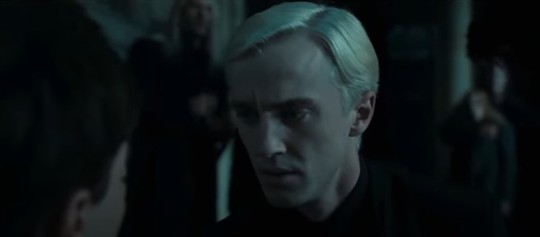
(See the link for the full clip)
This is not to say that he redeems himself entirely, of course. In the book he does try to capture Harry in the Room of Requirement with the stated intention of turning him over to Voldemort and only stops Crabbe because Voldemort wanted Harry brought to him alive.
“‘STOP!’ Malfoy shouted at Crabbe, his voice echoing through the enormous room. ‘The Dark Lord wants him alive.’
‘So? I’m not killing him, am I?’ yelled Crabbe, throwing off Malfoy’s restraining arm, ‘but if I can, I will, the Dark Lord wants him dead anyway, what’s the diff - ?’
. . . ‘Don’t kill him! DON’T KILL HIM!’ Malfoy yelled at Crabbe and Goyle.” (DH,sch, p.506-507)
Yet the movie plays the scene out differently. Draco never mentions Voldemort and hesitates to kill Harry even though Goyle urges him and Harry has exposed Draco to Goyle and Zabini as having sheltered him from Bellatrix in the manor. (See link for the full clip)
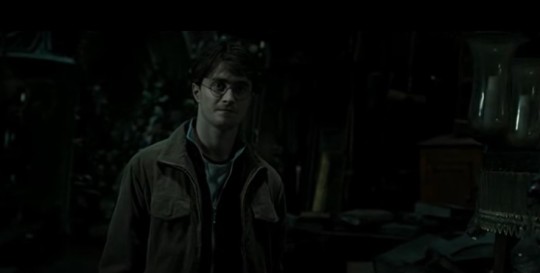
[Draco]: “Well, well. What brings you here Potter?”
[Harry]: “I could ask you the same thing.”
[Draco]: “You have something of mine. I’d like it back.”
[Harry]: “What’s wrong with the one you have?”
[Draco]: “It’s my mother’s. It’s powerful but it’s not the same. Doesn’t quite understand me. Know what I mean?”
[Harry]: “Why didn’t you tell her? Bellatrix. You knew it was me. You didn’t say anything.”
[Goyle]: “Come on Draco. Don’t be a prat. Do him.”
Yet whatever Draco’s motivations he’s clearly not on Harry’s side here, although there is a deleted scene in the movie where he throws his wand to Harry as Harry is escaping Voldemort. (See link for the full clip)
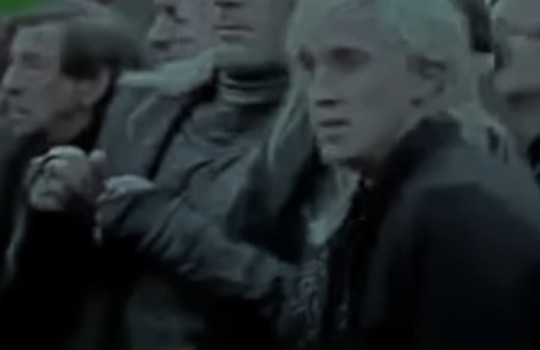
But this brings me back to Slytherin House and their isolation and shunning by the other three Houses.
The most painful and poignant example of Slytherin House’s shunning and isolation comes when Neville leads Harry and the others into the Room of Requirement.
‘[Harry] did not recognise the room at all. It was enormous and looked rather like the interior of a particularly sumptuous tree house, or perhaps a giant ship’s cabin. Multi-coloured hammocks were strung from the ceiling and from a balcony that ran around the dark wood-panelled and windowless walls, which were covered in bright tapestry hangings; Harry saw the gold Gryffindor lion emblazoned on scarlet, the black badger of Hufflepuff against yellow, on the bronze eagle of Ravenclaw, on blue. The silver and green of Slytherin alone were absent.” (DH, sch, p.464-465)
When things were at their worst, when the Death Eaters had taken over the school and were torturing any student who wouldn’t toe the party line, the other three Houses abandoned Slytherin House and left them to face the darkness alone. There was not one single Slytherin in the Room of Requirement, not even so much as an eleven-year-old first year. Are we to believe that not one single Slytherin was ever tortured or abused by the Carrows? They certainly had no problem torturing first years as Neville pointed out (DH, sch, p.463) and Snape is living proof there had to be a lot of half-bloods in Slytherin. Are we to believe that none of those Slytherins loved their muggle parent, or perhaps even their muggle siblings, that they weren’t aware of the terrible danger that Voldemort and his so-called “pure blood supremacy” cause posed to their families? We know this isn’t true as Rowling will show us before the end. Before this story plays out Rowling will show us that the lines between Gryffindor and Slytherin are actually very thin and that just as Slytherins can be brave, noble and self-sacrificing so too can Gryffindors be ruthless, vengeful and bigoted.
It is in Deathly Hallows that Harry shows us just how ruthless he can be. Twice he uses an Unforgivable curse. The first time is to break into Gringotts.
“‘Act now, act now,’ whispered Griphook in Harry’s ear, ‘the Imperious Curse!’
Harry raised the hawthorn wand beneath the cloak, pointed at the old goblin and whispered, for the first time in his life, ‘Imperio!’ (DH, sch, p.428)
Now, since this was done to steal one of the horcruxes it can be argued that it was a necessity of war.
This cannot be said of his use of the Cruciatus curse. Harry uses this curse three times in the series. The first is when he tries to curse Bellatrix in the Order of the Phoenix to avenge Sirius’s death.
“Hatred rose in Harry such as he’d never known before; he flung himself out behind the fountain and bellowed, ‘Crucio!’
Bellatrix screamed: the spell had knocked her off her feet, but she did not writhe and shriek with pain as Neville had – she was already back on her feet, breathless, no longer laughing . . . ‘Never used an Unforgivable Curse before, have you boy?’ She yelled. She had abandoned her baby voice now. ‘You need to mean them, Potter! You need to really want to cause pain – to enjoy it – righteous anger won’t hurt me for long.’ (OoP, sch, p. 715)
The second is in the Half Blood Prince when he tries to use it against Snape in order to avenge Dumbledore.
“Snape shouted, ‘Run, Draco!’ and turned: twenty yards apart he and Harry looked at each other before raising their wands simultaneously.
‘Cruc-‘
But Snape parried the curse, knocking Harry backwards off his feet before he could complete it . . .
‘Cruc-‘ yelled Harry for the second time, aiming for the figure ahead illuminated in the dancing firelight, but Snape blocked the spell again.” (HBP, sch, p.562)
Both times he is attempting to avenge the death of a loved one. He does not have that excuse the time he uses it in book version of the Deathly Hallows, which was left out of the movie.
‘Amycus moved forwards until he was offensively close to Professor McGonagall, his face within inches of hers. She refused to back away, but looked down at him as if he were something disgusting she had found stuck to a lavatory seat.
‘It’s not a case of what you’ll permit, Minerva McGonagall. Your time’s over. It’s us what’s in charge here now, and you’ll back me up or you’ll pay the price.’
And he sat in her face.
Harry pulled the Cloak off himself, raised his wand and said, ‘You shouldn’t have done that.’
As Amycus spun around, Harry shouted ‘Crucio!’
The Death Eater was lifted off his feet. He writhered through the air like a drowning man, thrashing and howling in pain, and then, with a crunch and a shattering of glass, he smashed into the front of a bookcase and crumpled, insensible, to the floor.
‘I see what Bellatrix meant,’ said Harry, the blood thundering through his brain. ‘you need to really mean it.’ . . .
‘He spat at you.’ Said Harry. (DH, sch, p.477)
Harry is not trying to protect anyone here. He is not trying to win the war or even avenge someone’s death as he did twice before. He didn’t even do it to punish Amycus Carrow for torturing the children in Hogwarts. McGonagall was not physically harmed and we are shown that while Amycus Carrow did threaten her that’s not why Harry tortured him. “‘He spat at you.’”
Harry did it simply to avenge an insult to McGonagall. Not even Draco went this far. When he tried to use the Cruciatus curse on Harry in the Half-Blood Prince he was in a fight and he was afraid of being exposed by his rival. Every other time after that he was coerced into it by Voldemort.
Yet here Rowling shows us not only a Gryffindor, but the hero of the story as being just as ruthless and, in this case, just as immoral as the villains. Yet we do not see anyone condemn Harry for this. Indeed, the head of Gryffindor calls his torturing a man to avenge an insult to her “‘Gallant; but foolish’” (DH, sch, p 477)
Which brings me back to how all the other Houses viewed Slytherin House as evil based on the actions of a few or the one.
After the interaction with Amycus Carrow McGonagall begins rallying Hogwarts to fight Voldemort and Slughorn questions her decision.
“‘My word,’ he puffed, pale and sweaty, his walrus moustache aquiver, ‘What a to do! I’m not at all sure whether this is wise, Minerva. He is bound to find a way in, you know, and anyone who has tried to delay him will be in most grievous peril-‘
‘I shall expect you and the Slytherins to be in the Great Hall in twenty minutes also,’ said Professor McGonagall, ‘If you wish to leave with your students we shall not stop you. But if any of you attempt to sabotage our resistance, or take up arms against us within this castle, then, Horace, we duel to kill.’
‘Minerva!’ he said aghast.
‘The time has come for Slytherin House to decide upon its loyalties.’ Interrupted Professor McGonagall.” (DH, sch, p. 484)
Now, I admit that Slughorn does not come off in the best light here, at least on the surface. Voldemort was coming and his policy was appeasement. But Slughorn’s concern was not for his own personal safety (as he will show later) but for the welfare of all those in the school. He advocated the wrong path here but for the right reasons. Not only that but in the collection “Short Stories from Hogwarts of Power, Politicians and Poltergeists” Rowling tells us that “[Slughorn] never enforced the violent discipline advocated by the Carrows and attempted to look after the students in his care as best he could.”
But I also have to question what McGonagall said. “The time has come for Slytherin House to decide upon its loyalties.”
McGonagall saying this raises a question that I think must be asked because it ties in directly with what I’ve been saying about Slytherin House being isolated and shunned. The question is; “what loyalty does Slytherin House owe the rest of Hogwarts?” After years of shunning and isolation, after years of being judged by and held accountable to the actions of others of their House while no other House is (otherwise all of Gryffindor and Ravenclaw would have been held accountable for the actions of Pettigrew and Quirrell) I must ask; why should Slytherin House show loyalty to those who never showed any loyalty to them? Why should they fight for those who never once fought for them?
Yet in the end we’ll see that not even McGonagall, reputed to be the fairest teacher in Hogwarts was willing to give Slytherin House a chance when faced with the action of only one out of the entire House. It was Pansy Parkinson, and Pansy alone out of all of Slytherin House that wanted to turn Harry over to Voldemort, yet McGonagall rejected the entire House on the basis of the action of this one person.
“Then a figure rose from the Slytherin table and he recognised Pansy Parkinson as she raised a shaking arm and screamed, ‘But he’s there! Potter’s there! Someone grab him!’
Before Harry could speak there was a massive movement. The Gryffindors in front of him had risen and stood facing, not Harry but the Slytherins. Then the Hufflepuffs stood, and, almost at the same moment, the Ravenclaws, all of them with their backs to Harry, all of them looking towards Pansy instead, and Harry awestruck and overwhelmed, saw wands emerging everywhere, pulled from beneath cloaks and from under sleeves.
‘Thank you, Miss Parkinson,’ said Professor McGonagall in a clipped voice. ‘You will leave the hall first with Mr. Filch. If the rest of your house could follow.’
Harry heard the grinding of benches and then the sound of the Slytherins trooping out on the other side of the hall.” (DH, sch, p.490-491)
The movie version differs slightly in the ending of that scene. (see link for the full clip)
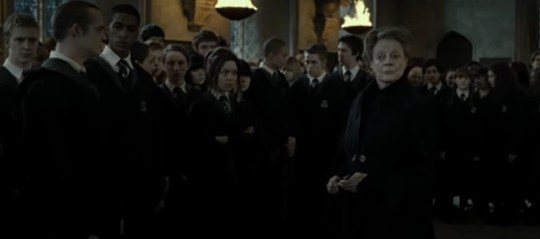
[Pansy]: “What are you waiting for? Someone grab him!”
[Filch]: “Students out of bed! Students out of bed! Students in the corridor!”
{McGonagall]: “They are supposed to be out of bed, you blithering idiot!”
[Filch]: “Oh. Sorry mum.”
[McGonagall]: “As it happens Mr. Filch your arrival is most opportune. If you would, I would like you to lead Miss Parkinson and the rest of Slytherin House from the hall.”
[Filch]: “Exactly where is it I’ll be leading them too mum?”
[McGonagall]: “The dungeons would do.”
In the book the Slytherins are escorted of Hogwarts and released, in the movie they’re imprisoned in the dungeons but in both all are condemned for the actions of one and given no chance to prove themselves one way or the other. Yet, I doubt anyone would demand that all of Gryffindor or Ravenclaw be held accountable for the actions of those Death Eaters that came from those Houses. And there were Death Eaters from Gryffindor and Ravenclaw. Rowling says so herself in an interview with the Leaky Cauldron.
ES: But there aren’t a lot of Death Eater children in the other houses, are there?
JKR: You will have people connected with Death Eaters in the other houses, yeah, absolutely. (See the link for the full interview)
So, yes. Whether or not there were any supporters of Voldemort in the other three Houses in the current generation of Hogwarts, in the previous wizarding war with Voldemort, there certainly were. Peter Pettigrew and Quirinus Quirrell were only two of them.
Rowling brings all of this prejudice to a head for Harry when he watches Snape’s memories in the Pensieve. This is where she shows us that tolerance and bigotry are not attributes that belong solely to one House or the other as Harry gets his prejudices pretty much rammed right down his throat when he is shown Snape and Lily’s first meeting with James and Sirius.
“‘Slytherin?’
One of the boys sharing the compartment, who had shown no interest at all in Lily or Snape until that point, looked round at the word, and Harry, whose attention had been focused entirely on the two beside the window, saw his father: slight, black-haired like Snape, but with that indefinable air of having been well cared for, even adored, that Snape so conspicuously lacked.
‘Who wants to be in Slytherin? I’d think I’d leave, wouldn’t you?’ James asked the boy lounging on the seats opposite him, and with a jolt, Harry realised that it was Sirius. Sirius did not smile.
‘My whole family have been in Slytherin,’ he said.
‘Blimey,’ said James, ‘and I thought you seemed all right.’
Sirius grinned.
‘Maybe I’ll break the tradition. Where are you heading, if you’ve got the choice?’
James lifted an invisible sword.
‘Gryffindor, where dwell the brave at heart. Like my dad.’
Snape made a small disparaging noise. James turned on him.
‘Got a problem with that?’
‘No.’ said Snape, though his slight sneer said otherwise. ‘If you’d rather be brawny than brainy –‘
‘Where’re you hoping to go, seeing as you’re neither?” interjected Sirius.
James roared with laughter. Lily sat up, rather flushed, and looked from James to Sirius in dislike.’ (DH, sch, p.538-539)
Now Snape was obviously just as snotty and prejudice towards Gryffindor as James was towards Slytherin. But James’ words strike a very familiar note here. Because we’ve heard them before. From Draco Malfoy in The Philosopher’s Stone; “- imagine being in Hufflepuff, I’d think I’d leave, wouldn’t you?” (PS, ill, p.68)
James Potter is in many ways like Draco Malfoy, like Dudley Dursley, like the Death Eaters at the Quidditch World Cup. The lines that Rowling draws between the two are very clear. He is just as much of a bully as they are and he is just as prejudiced and bigoted towards Slytherins as Malfoy is towards Muggle-borns. And where do you think James Potter learned that bigotry from?
If Dudley learned to be a bully through his parents telling him that everything he did was right and perfect and that those who are different are freaks, and if Draco learned Pure-Blood mania and to despise muggle-borns from his parents then where do you think James Potter learned his bigotry from? He learned it from the same place they did, over the breakfast table.
We are told in The Order of the Phoenix that Lily didn’t start dating James until he’d stopped being a bully.
“‘She started going out with him in seventh year,’ said Lupin.
‘Once James had deflated his head a bit.’ said Sirius.
‘And stopped hexing people just for the fun of it,’ said Lupin.” (OoP, sch, p.591)
James may have stopped being a bully by his seventh year (with the exception of Snape, because as Remus pointed out Snape was an exception because ‘he never lost the opportunity to curse James and you couldn’t expect James to take that lying down could you?”) (OoP, sch, p.592) But as Snape pointed out in The Half-Blood Prince; ‘Your father would never attack me unless it was four on one.’ (HBP, sch, p.562) They also never attacked Snape where Lily could see.
Sirius may have claimed that “‘A lot of people are idiots at the age of fifteen. He grew out of it.’” (OoP, sch, p.592) But here’s the thing. People don’t normally decide to stop being bullies, they don’t just “grow out of it”, especially if they’ve been taught for most of their lives that their behaviour, if not socially acceptable, will at least be tolerated with nothing more than a slap on the wrist. It takes a serious kick in the teeth for bullies to learn the empathy to understand the pain their actions have caused. This is something that Rowling shows us very clearly in the canon of the books, through both Draco and Dudley.
With Dudley it was the attack by the dementors. We don’t know what painful memories he was forced to relive, but whatever it was, this is what causes the change in him that we see in Deathly Hallows.
With Draco it was not only having Voldemort and his Death Eaters move into his family home, it was the bitter realisation during his sixth year of just what being a Death Eater meant.
We never learn what it was that caused James Potter to change but based on what Rowling has shown us to date, I’m pretty sure that something happened.
In this same way it was watching Snape’s memories in the Penseive that forced Harry to finally confront his final prejudice towards Slytherin House. Rowling shows us this in Harry’s thoughts about Snape, Tom Riddle and Dumbledore as he walks to what he believes is his death in the Forbidden Forest.
“Hogwarts was the first and best home he had known. He and Voldemort and Snape, the abandoned boys, had all found home here . . .” (DH, sch, p.558)
I think it is very notable that after Harry’s return from death he no longer calls Tom Riddle “Voldemort” anymore. He doesn’t call him Tom the way Dumbledore did, but he is Riddle now, not Voldemort.
It is also in the final battle where Rowling shows us that Harry and the other three Houses were so very wrong in their prejudice against Slytherins. Because it was Horace Slughorn who brought the reinforcements that turned the tide against Riddle, including members of Slytherin House.
“. . . Harry saw Charlie Weasley overtaking Horace Slughorn, who was still wearing his emerald pyjamas. They seemed to have returned at the head of what looked like the family and friends of every Hogwarts student who remained to fight, along with the shopkeepers and homeowners of Hogsmead.” (DH, sch, p.588)
And there were Slytherins among those reinforcements. Rowling specifically states this in an interview with the Leaky Cauldron editors.
“[JKR]: A part of the final battle that made me smile was Slughorn galloping back with Slytherins . . . but they’d gone off to get reinforcements first, you know what I’m saying? But yes, they came back, they came back to fight, so I mean- but I’m sure that many people would say “Well, that’s common sense, isn’t it? Isn’t that smart, to get out, get more people and come back with them?” (see here for the link)
Those Slytherins could have kept right on running once they got out of Hogwarts. They didn’t have to come back with the reinforcements. But in the end, they chose to fight against Tom Riddle, the man who wanted to destroy the other three Houses so that only Slytherin House would remain:
“‘There will be no more sorting at Hogwarts School,’ said Voldemort. ‘There will be no more houses. The emblem, shield and colours of my noble ancestor, Salazar Slytherin, will suffice for everyone . . .’” (DH, sch, p.586)
The Slytherins who returned with Slughorn and the reinforcements fought against that. They chose to fight for Hogwarts and all the four houses instead.
Remember what I said earlier about how during this terrible last year at Hogwarts, the other houses let Slytherin House stand alone? Slytherin House had lived the same year under threat of torture and death that the other houses had but they had done so without the support of the others because they were judged to be the same as the oppressors.
Yet they still came back despite this. And in doing so J. K. Rowling shows us there were Slytherins who were loyal and courageous and honourable even in the face of death. By their actions in the final battle the Slytherins proved themselves as loyal as any Hufflepuff, brave as any Gryffindor and as smart as any Ravenclaw. In Regulus Black J.K. Rowling showed us that Slytherins could be just as tolerant, compassionate and self-sacrificing as Dumbledore and Severus Snape showed us the heights of intelligence, courage and nobility that a Slytherin could reach when driven by the power of love.
And the reason she does this is because of something that she states in an interview with the Leaky Cauldron before the release of the Deathly Hallows in 2005.
ES: Why is Slytherin house still –
JKR: Still allowed!
[All laugh]
ES: Yes! I mean, it’s such a stigma.
JKR: But they’re not all bad. They literally are not all bad. [Pause.] Well, the deeper answer, the non-flippant answer, would be that you have to embrace all of a person, you have to take them with their flaws, and everyone’s got them. It’s the same way with the student body. If only they could achieve perfect unity, you would have an absolute unstoppable force, and I suppose it’s that craving for unity and wholeness that means that they keep that quarter of the school that maybe does not encapsulate the most generous and noble qualities, in the hope, in the very Dumbledore-esque hope that they will achieve union, and they will achieve harmony. Harmony is the word.
Harmony is needed yes. But so is healing. Because in the end this is Harry’s story and we see the journey he makes from prejudice and even bigotry at times towards understanding in regards to Slytherin House. At the end of Deathly Hallows we learn that he named his youngest son Albus Severus in honour of Snape’s courage and tells him that it doesn’t matter which house he’s in. These two will go on to have problems in the play “Harry Potter and the Cursed Child”, but for the titular hero of this series we are given hope that the prejudice and ostracization that Slytherin House has endured for centuries has finally come to an end, even if the healing of those wounds will be long in the process.
Bibliography
1. The Crimes of Grindelwald, David Yates, Warner Bros, 2018
2. Harry Potter and the Chamber of Secrets, Christopher Columbus, Warner Bros, 2002
3. Harry Potter and the Deathly Hallows part 1, David Yates, Warner Bros, 2010
4. Harry Potter and the Deathly Hallows part 2, David Yates, Warner Bros, 2011
5. Harry Potter and the Goblet of Fire, Mike Newell, Warner Bros, 2005
6. Harry Potter and the Half Blood Prince, David Yates, Warner Bros, 2009
7. Harry Potter and the Order of the Phoenix, David Heyman, Warner Bros, 2007
8. Harry Potter and the Philosopher’s Stone, Christopher Columbus, Warner Bros, 2001
9. Harry Potter and the Prisoner of Azkaban, Alfonso Cuarón, Warner Bros, 2004
10. The Leaky Cauldron, The Leaky Cauldron and MN Interview Joanne Kathleen Rowling, http://www.the-leaky-cauldron.org/2007/07/28/jkrhbp3/, July 28, 2007.
11. The Leaky Cauldron, The Leaky Cauldron and MN Interview Joanne Kathleen Rowling, http://www.the-leaky-cauldron.org/2008/01/02/pottercast-131-j-k-rowling-interview-transcript/, July 28, 2007.
12. Merrriam-Websters dictionary
13. Rowling, J.K. Chamber of Secrets. J.K. Rowling archive. Wizardingworld.com. https://www.wizardingworld.com/writing-by-jk-rowling/dolores-umbridge
14. Rowling, J.K. Harry Potter and the Chamber of Secrets, illustrated: London: Bloomsbury Publishing: 2016
15. Rowling, J.K. Harry Potter and the Deathly Hallows, Raincoast Books: London, Bloomsbury Publishing: 2007
16. Rowling, J.K. Harry Potter and the Goblet of Fire, illustrated: London: Bloomsbury Publishing: 2019
17. Rowling, J.K. Harry Potter and the Half -Blood Prince, Raincoast Books: London: Bloomsbury Publishing: 2005
18. Rowling, J.K. Harry Potter and the Order of the Phoenix, Raincoast Books: London: Bloomsbury Publishing: 2003
19. Rowling, J.K. Harry Potter and the Philosopher’s Stone, illustrated: London: Bloomsbury Publishing: 2015
20. Rowling, J.K. Harry Potter and the Prisoner of Azkaban, illustrated: London: Bloomsbury Publishing: 2017
#Harry Potter#Draco Malfoy#Voldemort#Dumbledore#Hogwarts#Harry Potter meta#My meta#JK Rowling#Ron Weasely#Hermione Granger#prejudice#discrimination#war#violence
12 notes
·
View notes
Note
but also i need malfoy meta? like how did narcissa get to be where she was? is there anything she wouldn't do for her family? how does she actually feel about her sisters? i need malfoy things pls
Gonna put this giant fucking rant about my most precious Malfoy under a cut. Because I am just gonna go off!! (And honestly it does get really long).
So let’s kick this off by directing you here for a little light reading because instead of plotting I mostly just fucking regurgitated a lot of Narcissa feels.
So - obviously - given the scant information we have in the books, a lot of this is just my head canon and I mean, you know, whatever. Take it or leave it. The only exception to this is Narcissa, Lucius & Draco’s love for each other. They love each other and I will accept literally nothing else. (Like most specifically Narcissa and Lucius’ love for each other, and their love for their son. Draco’s feelings may be more complicated - understandable so - but Lucius and Narcissa LOVE each other and they LOVE their son and yes they made mistakes and may not have raised him perfectly (what parent does???) but you can get the fuck out of here if you think Lucius was an abusive husband or father…)
And then we start to swathe out into the muddy waters of my feelings / interpretations. I’m sorry it’s a bit scatter shot but… It’s just what happened.
So I think one of the biggest things I need to state here is I play very heavily with the canon timeline - ignoring and acknowledging it at my whim. So I often play it so that Narcissa is in the same school year as Severus (sometimes along with Lucius, sometimes not) with Andromeda the year above and Bellatrix again the year above that. And this comes into play more later on. So let’s begin.
Narcissa Black is the third and last child of Cygnus Black III & Druella Rosier. She was meant to be a boy (as, honestly, were her two sisters before her) but she was a last ditch attempt. Narcissa is aware of this flaw from a young age - and while she is not abused for it - there is a certain… Emotional neglect. She is spoiled, treasured and she supposes it is what love feels like. But there is also the pervasive knowledge that she is a tool - more than she is a person.
She is to be wed to a man from another high-class family. Andromeda and Bellatrix are betrothed to the Lestrange Brothers and she is… For a long time, unsettled. There is a fear she will be wed to her cousin - Sirius or Regulus - as her aunt and uncle were. However, nothing trouble her more than the delay - the delay in finding her a suitor. Is she unloveable? Is she unmarriageable..? What is wrong with her?That is the first fear Narcissa Black remembers having.
The second is the fear of madness. Their family breeds in - as they have to if they wish to stay ‘toujours pur’ - and you can see glimmers of madness in Bellatrix certainly (something made only worse by Azkaban) and in some people’s interpretations, Walburga. I also think that Violetta Bulstrode (for whom she has her middle name) her great grandma went mad and Narcissa witnessed this at a young age.
This is her second biggest fear and eclipses her first fear easily. Because - because she is raised to believe she is special, beautiful and precious. She is different from her sisters (and there is always an inkling, perhaps, that she is not her father’s daughter) in looks. She is blonde, beautiful and brilliant. You can fake enough to make yourself loveable. You cannot hide insidious madness creeping through your veins.
It’s why - I play her as a very controlled, very private person - with a surface veneer of sociability. She laughs, she smiles, she parties, she charms - but her inner workings, her thoughts are private. Her fears, her sadness, her anger - she keeps a tight reign on them and has for a very long time (which backs up her skill at occlumency).
So - you’ve got a special young woman - Bellatrix is probably treated very strictly, Andromeda is, likely as the middle child, ignored. And Narcissa - the baby, is also - quite possibly ignored, but a little more spoiled and the one for whom the rules don’t exist.
They spend a lot of time together - learning to be proper ladies and Andy is her favourite. Bellatrix has an edge of cruelty to her, a temper often left uncontrolled - the loudest voice and the harshest opinions. Sirius is nicer than Bellatrix but their personalities are both loud and dominant, and so, she likes Regulus better too.
Bellatrix goes to school. It is her and Andy alone now (and, occasionaly, the boys) and she loves it. Adores the monopoly of her sisters time and affection, resents it when Bellatrix comes home but must keep that to herself. Andy goes to school and she is bereft. Alone. Her parents have little to no interest. It feels like a year of solitude (she is, of course, entirely too dramatic in this regard).
And then she goes to Hogwarts and it should be the best time of her life. While at school she doesn’t put in as much effort as she could, or perhaps should into her school work - she has already learnt there are no consequences for her - and she’s more than willing to get someone else to do her homework for her. Sirius ruined it, of course, by being sorted into Gryffindor. It is the first crack in the perfect facade of her family. (Depending, on of course, where Andromeda went when she was sorted.)
It upsets her, of course - as does everything else he carries on doing - he is still her cousin (even if he isn’t her favourite). And him leaving - it shredded their family in her opinion. It made it very easy to hate him.
When Andy leaves - it’s harder. That’s her sister, her favourite sister and it is the most painful thing she could do - to abandon Narcissa like that. Like she doesn’t even care about her family. Hating Andromeda - she… She can’t. She knows she should, Bellatrix who has suddenly turned her full attention onto her tells her she should. Her parents tell her she should. Her aunt and uncle tell her she should.
And she can’t. She wants to. She can’t. She loves Andy.
But it’s not like she can see her anymore.
She needs space to breathe - but suddenly - there isn’t any, the pressure is unbearable and there isn’t anyone she can talk to. And Bellatrix - she loves her sister but this… This is too much.
But she endures. It’s what she does. I’m not sure how she gets over it - she probably meets Andy in secret - vents her spleen and then… Puts up and shuts up.
As for Lucius and Narcissa. I am very free flow about how it happens - Arranged marriage? I’m on board for that. Something more organic? Yes please. Something - somehow - to do with Severus introducing them? Fuck yes.
But like I said, they love each other. I’m not very specific on the how or why - I can pretend I’m keeping it open for whoever I’m playing opposite - but there is, for Narcissa, that recognition of - oh. This. This is what love actually is. This is what it actually is. I’m not sure if it feels… Unconditional? To her but there is something there - that tethers to her to him.
Draco - I feel is (and this is where I snap back to the original timeline) is their only child for a reason. I think - and if Narcissa and Lucius are older than James and Lily - it’s either because they waited or because they had difficulties. Given how doting we canonically see Narcissa to be (sending her son weekly care packages, refusing to let him go to Durmstang) and the fact he is their only son, I am inclined to believe the latter.
And I think - for Draco - For Lucius - well Narcissa says it best herself:“Let go, Bella!” snarled Narcissa, and she drew a wand from beneath her cloak, holding it threateningly in the other’s face. Bella merely laughed. “Cissy, your own sister? You wouldn’t–” “There is nothing I wouldn’t do anymore!” Narcissa breathed, a note of hysteria in her voice, and as she brought down the wand like a knife, there was another flash of light. Bella let go of her sister’s arm as though burned.
I think - one of the big problems I have with Cursed Child - is apparently after all that… After lying to Voldemort - who would kill them all if she was discovered - After running, unarmed, screaming for their son at the battle of Hogwarts - Narcissa and Lucius would lose their son and their grandson to bigotry? No. No way. Narcissa has lost too much of her family. She would swallow her pride and suck it up. And she might not be the best at it, at first - but she would not lose her son over who he chose to marry, who he chose to love any more than she would cut off her own arm. She might never be perfect but she would try. (And let’s not get into how the last movie /cursed child shits all over that bc. I will kill.) (And yes, you can directly transfer this on to Drarry and Scorbus or Dramione or whatever other non-traditional choices you might have for Draco. Narcissa would figure it out somehow simply because she has to.)
(Also gimmie all the post war Lucissa angst.) (And all the first war Lucissa living the high life of pureblood & death eater elite) (And then also the post Voldemort fall high life too) (just give me Lucissa who love each other and make each other better and build each other up or give me death.) (I’m getting tired now and this is devolving, so I think this is where I’m gonna have to leave it but if you have more specific things you want me to explore plz plz plz prompt them - for any of my characters bc I love ranting I s2g)
2 notes
·
View notes